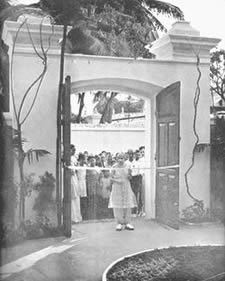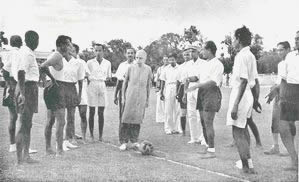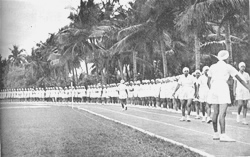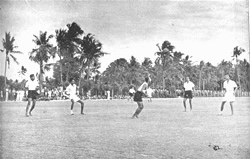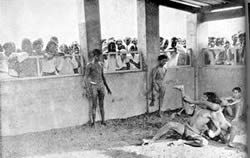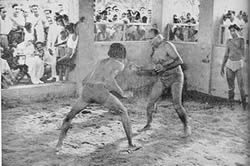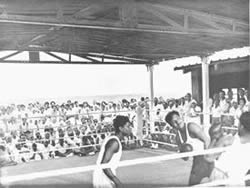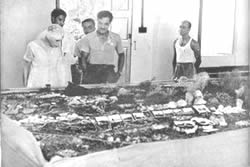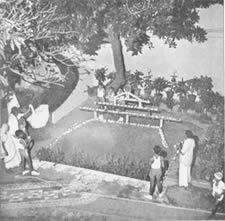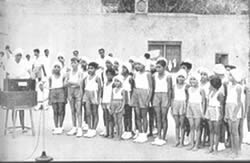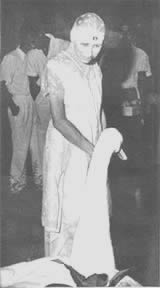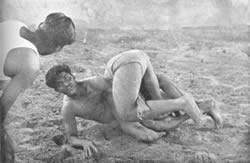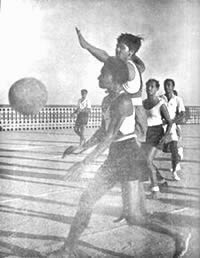|
Bulletin of Physical Education Bulletin d'Education Physique
|
The Ideal of Human Unity
|
CHAPTER VII THE CREATION OF THE HETEROGENEOUS NATION THE problem of a federal empire founded on the sole foundation that is firm and secure, the creation of a true psycho- logical-unity,—an empire that has to combine heterogeneous. elements,—resolves itself into two different factors, the question of the form and the question of the reality which the form is intended to serve. The former is of great practical importance, but the latter alone is vital. A form of unity may render possible, may favour or even help actively to create the corresponding reality, but it can never replace it. And, as we have seen, the true reality is in this order of Nature the psychological, since the mere physical fact of political and administrative union may be nothing more than a temporary and artificial creation destined to collapse irretrievably as soon as its immediate usefulness is over, or the circumstances that favoured its continuance are radically or even seriously altered. The first question, then, that we have to consider is what this reality may be which it is intended to create in the form of a federal empire, and especially we must consider whether it is to be merely an enlargement of the nation- type, the largest successful human aggregate yet evolved by Nature, or a new type of aggregate which is to exceed and must tend to supersede the nation, as that has replaced the tribe, the clan and the city or regional state. The first natural idea of the human mind in facing such a problem is to favour the idea which most flatters and seems to continue its familiar notions. For the human mind is, in the mass, averse' to a radical change of conception. It accepts change most |
CHAPITRE VII LA CRÉATION DE LA NATION HÉTÉROGÈNE
LE problème d'un empire fédéral fondé sur la seule base qui soit ferme et sûre, la création d'une vraie unité psychologique, un empire qui doit combiner des éléments hétérogènes, comprend deux différents facteurs, la question de la forme et la question de la réalité que la forme a pour but de servir. La première est d'une grande importance pratique, mais seule la dernière est vitale. Une forme d'union peut rendre possible la création de la réalité correspondante; elle peut la favoriser ou même l'aider activement, mais elle ne peut jamais la remplacer. Et, ainsi que nous l'avons vu, la vraie réalité est dans cet ordre de la Nature la psychologique, puisque le simple fait physique d'une union politique et administrative peut n'être rien de plus qu'une création temporaire et artificielle, destinée à s'effondrer irrémédiablement aussitôt que son utilité immédiate est passée ou que les circonstances qui ont favorisé sa continuation sont radicalement ou même sérieusement modifiées. La première question que nous avons donc à considérer est ce que peut être la réalité qui est à créer dans la forme d'un empire fédéral; et spécialement nous devons considérer si elle doit être simplement un élargissement du type nation, le plus grand agrégat humain qui ait jusqu'à présent été développé avec succès par la Nature, ou un nouveau type d'agrégat qui doit surpasser et tendre à supplanter la nation, comme celle-ci a remplacé la tribu, le clan et la cité ou l'état régional. La première pensée naturelle à l'esprit humain en affrontant un tel problème est de favoriser l'idée qui flatte le plus ses notions familières et semble les continuer. Car la mentalité humaine dans
|
Page – 2 - 3
|
easily when its reality is veiled by-the continuation of a habitual form of things or else by a ceremonial, legal, intellectual or sentimental fiction. It is such a fiction that some think to create as a bridge from the nation-idea to the empire-idea of political unity. That which unites men most securely now is the physical unity of a common country to live in and defend, a common economic life dependent on that geographical oneness and the sentiment of the motherland which grows up around the physical and economic fact and either creates a political and administrative unity or keeps it to a secure permanence, once it has been created. Let us then extend this powerful sentiment by a fiction, let us demand of the heterogeneous constituents of the empire that each shall regard not his own physical motherland but the empire as the mother or at least, if he clings to the old sentiment, learn to regard the empire first and foremost as the greater mother. A variation of this idea is the French notion of the mother country, France; all the other possessions of the empire, although in English phraseology they would rather be classed as dependencies in spite of the large share of political rights conceded to them, are to be regarded as colonies of the mother country, grouped together in idea as France beyond the seas and educated to centre their national sentiments around the greatness, glory and loveableness of France the common mother. It is a notion natural to the Celtic-Latin temperament, though alien to the Teutonic, and it is supported by a comparative weakness of race and colour prejudice and by that remarkable power of attraction and assimilation which the French share with all the Celtic nations. The power, the often miraculous power of such fictions ought not for a moment to be ignored. They constitute Nature's most common and effective method when she has to deal with her own ingrained resistance to change in her mentalised animal, man. Still there are conditions without which a fiction cannot succeed for long or altogether. It must in the first place be based on a plausible superficial resemblance. It must lead to a realisable fact strong enough either to replace the fiction itself or eventually to justify. And this realisable fact must progressively |
son ensemble s'oppose à tout changement radical de conception. Elle accepte très facilement le changement quand sa réalité est voilée par la continuation de la forme habituelle des choses, ou bien par une fiction cérémonielle, légale, intellectuelle ou sentimentale. C'est une semblable fiction que certains pensent à créer comme pont entre l'idée de nation et l'idée d'empire, en tant qu'unités politiques. Ce qui maintenant unit les hommes le plus fermement est l'unité physique d'un pays commun pour y vivre et le défendre, une vie économique commune dépendant de cette unité géographique, et le sentiment de la patrie qui se développe autour du fait physique et économique et qui crée une unité politique et administrative ou lui conserve une solide permanence une fois qu'elle a été créée. Élargissons donc par une fiction ce sentiment puissant; demandons aux constituants hétérogènes de l'empire que chacun ne regarde pas sa propre patrie physique, mais l'empire, comme sa mère, ou tout au moins, s'il s'accroche au vieux sentiment, qu'il apprenne à regarder l'empire d'abord et avant tout comme la plus grande mère. Une variante de cette idée est la notion française de la mère-patrie, la France; toutes les autres possessions de l'empire, qui dans la phraséologie anglaise seraient plutôt classées comme des dépendances en dépit de la grande part de droit politique qui leur est concédée, doivent être considérées comme des colonies de la mère-patrie, groupées en idée dans la France d'Outremer, et éduquées à centrer leurs sentiments nationaux sur la grandeur, la gloire et le charme de la France, la mère commune. Cette notion est naturelle au tempérament celto-latin, quoique étrangère au teuton; elle est soutenue par une faiblesse relative du préjugé de race et de couleur, et par cette puissance remarquable d'attraction et d'assimilation que la France possède en partage avec toutes les nations celtiques. Le pouvoir de telles fictions, un pouvoir souvent miraculeux, ne doit pas être méconnu, même pour un moment. Ces fictions constituent la méthode la plus commune et la plus efficace de la Nature quand elle a affaire à sa résistance obstinée à tout changement dans son animal mentalisé: l'homme. Cependant il est des conditions sans lesquelles une fiction ne peut pas réussir pendant |
Page – 4 - 5
|
realise itself and not remain too long in the stage of the formless nebula. There was a time when these conditions were less insistently necessary, a time when the mass of men were more imaginative, unsophisticated, satisfied with a sentiment or an appearance; but as the race advances, it becomes more mentally alive, self-conscious, critical and quick to seize dissonances between fact and pretension. Moreover, the thinker is abroad; his words are listened to and understood to an extent unprecedented in the known history of mankind and the thinker tends to become more and more an inquisitor, a critic, an enemy of fiction¹ Is then this fiction based upon a realisable parallel,—in other words, is it true that the true imperial unity when realised will be only an enlarged national unity? Or, if not, what is the realisable fact which this fiction is intended to prepare? There have been plenty of instances in history of the composite nation and, if the parallel is to be accepted as effective, it is such a composite nation on a large scale which it is the business of the federal empire to create. We must, therefore, cast a glance at the most typical instances of the successful composite nation and see how far the parallel applies and whether there are difficulties in the way which point rather to the necessity of a new evolution than to the variation of an old success. To have a just idea of the difficulties may help us to see how they can be overcome. The instance most before our eyes both of the successfully evolved composite or heterogeneous nation and of the fortunately evolving heterogeneous empire is that of the British nation in the past and the British Empire in the present,—successfully, but, fortunately, with a qualification; for it is subject to the perils of a mass of problems yet unsolved.² The British nation has been composed of an English-speaking Anglo-Norman England,
¹ These conditions too may very well soon disappear; for freedom of thought is menaced everywhere and, where there is no freedom of thought, . there will be the disappearance of the power of the thinker. ² It must be remembered that this was written some decades ago and circumstances and the Empire itself have wholly changed; the problem, as it was then, no longer poses itself. |
longtemps ou complètement. Tout d'abord elle doit être basée sur une ressemblance superficielle plausible. Elle doit mener à un fait assez fort pour remplacer la fiction elle-même ou finalement pour la justifier. Et ce fait réalisable doit se réaliser progressivement et non pas rester trop longtemps à l'état de nébuleuse sans forme. Il fut un temps où la nécessité de ces conditions avait moins d'insistance, un temps où la masse des hommes était plus imaginative, plus candide, plus facilement satisfaite d'un sentiment ou d'une apparence. Mais à mesure que la race avance, elle devient plus éveillée mentalement, plus consciente, plus critique et plus prompte à saisir les dissonances entre les faits et les prétentions. En outre, le penseur est au large; ses paroles sont écoutées et comprises à un point sans précédent dans l'histoire connue de l'humanité; et le penseur tend à devenir de plus en plus l'inquisiteur, le critique, l'ennemi de la fiction.1 Cette fiction a-t-elle donc comme base un parallèle dans la réalité; en d'autres mots, est-il vrai que l'unité impériale véritable, si elle se réalise, ne soit qu'une unité nationale élargie? Ou, si cela n'est pas, quel est le fait réalisable que cette fiction a pour but de préparer? Il y a eu dans l'histoire beaucoup d'exemples de nations composites et, si le parallèle doit être accepté comme effectif, c'est une semblable nation composite sur une plus grande échelle, que l'empire fédéral a pour rôle de créer. Nous aurons donc à jeter un regard sur les exemples les plus typiques de nation composite ayant réussi, pour voir jusqu'à quel point le parallèle s'applique et s'il y a sur le chemin des difficultés qui font prévoir la nécessité d'une nouvelle évolution plutôt qu'une variante d'un vieux succès. D'avoir une idée juste des difficultés nous aidera à trouver comment elles peuvent être surmontées. La nation britannique dans le passé et l'Empire Britannique dans le présent, sont devant nos yeux les exemples les plus frappants d'une nation composite ou hétérogène développée avec succès et d'un empire hétérogène se développant heureusement.
1 Ces conditions elles-mêmes peuvent très bien disparaître bientôt; car la liberté -de pensée est menacée partout, et là où il n'y a pas de liberté de pensée, le pouvoir du penseur disparaît. |
Page – 6 - 7
|
a Welsh-speaking Cymric Wales, a half-Saxon, half-Gaelic English-speaking Scotland and very imperfectly, very partially, of a Gaelic Ireland with a mainly Anglo-Scotch colony that held it indeed by force to the united body but was never able to compel a true union. Ireland was, until recently, the element of failure in this formation and it is only now and under another form and under other circumstances than its. other members that some kind of unity with the whole, still very precarious, and with the empire, not with the British nation, is becoming possible, although even yet it has hardly begun to be real.¹What were the determining circumstances of this general success and this partial failure and what light do they shed on the possibilities of the larger problem? In building up her human aggregates, Nature has followed in general principle the same law that she observes in her physical aggregates. She has provided first a natural body, next a common life and vital interest for the constituents of the body, last a conscious mind or sense of unity and a centre or governing organ through which that common ego-sense can realise itself and act. There must be in her ordinary process either a common bond of descent or past association that will enable like to adhere to like and distinguish itself from unlike and a common habitation, a country so disposed that all who inhabit within its natural boundaries are under a sort of geographical necessity to unite. In earlier times when communities were less firmly rooted to the soil, the first of these conditions was the more important. In settled modern communities the second predominates; but the unity of the race, pure or mixed—for it need not have been one in its origin—remains a factor of importance, and strong disparity and difference may easily create serious difficulties in the way of the geographical necessity imposing itself with any permanence. In order that it may impose itself, there must be a considerable force of the second natural condition, that is to say,
¹ This was written when Home Rule seemed to be a possible solution; the failure has now become a settled fact and Ireland has become the independent Republic of Ireland. |
Avec succès, oui; avec bonheur, non sans réserve; car l'Empire reste soumis aux périls d'une quantité de problèmes non encore résolus.1 La nation britannique a été composée d'une Angleterre anglo-normande parlant l'anglais, d'un Pays de Galles cymrique parlant le gallois, d'une Écosse mi-saxonne, mi-gaélique, parlant l'anglais, et très imparfaitement, très partiellement d'une Irlande gaélique avec une colonie principalement anglo-écossaise qui la maintint par force dans le corps uni, mais qui ne fut jamais capable d'imposer une vraie union. Jusqu'à récemment l'Irlande était l'élément d'insuccès dans cette formation, et c'est seulement maintenant, sous une autre forme et dans d'autres circonstances que celles des autres membres, qu'une sorte d'unité avec le tout, encore très précaire, et avec l'Empire, non avec la nation britannique, devient possible, quoique même maintenant elle ait à peine commencé à être réelle.2 Quelles furent les circonstances déterminantes de ce succès général et de cet échec partiel, et quelle est la lumière qu'elles projettent sur les possibilités du plus grand problème? En construisant ses agrégats humains la Nature a suivi en principe général la même loi qu'elle suit dans ses agrégats physiques. Elle a fourni d'abord un corps naturel, puis une vie commune et un intérêt vital pour les constituants du corps, enfin une mentalité consciente ou sens d'unité et un centre ou organe gouvernant par lequel ce sens de l'ego commun peut se réaliser et agir. Il doit y avoir dans son processus ordinaire, soit un lien commun de descendance, soit une association dans le passé, qui permette au semblable d'adhérer au semblable et de se distinguer du dissemblable, et un habitat commun, un pays disposé de telle façon que tous ceux qui habitent au dedans de ses frontières naturelles soient soumis à une sorte de nécessité géographique de s'unir. Dans l'ancien temps, quand les communautés étaient
1 Il faut se souvenir que ceci a été écrit il y a des dizaines d'années, et que les circonstances et l'Empire lui-même ont pleinement changé. Le problème tel qu'il était alors, ne se pose plus. 2 Ceci fut écrit quand le "Home Rule" semblait être une solution possible; l'échec est maintenant un fait établi et l'Irlande est devenue la République indépendante d'Irlande. |
Page – 8 - 9
|
a necessity of economic unity or habit of common sustenance and a necessity of political unity or habit of common vital organisation for survival, functioning and aggrandisement. And in order that this second condition may fulfil itself in complete force, there must be nothing to depress or destroy the third in its creation or its continuance. Nothing must be done which will have the result of emphasising disunity in sentiment or perpetuating the feeling of separateness from the totality of the rest of the organism; for that will tend to make the centre or governing organ psycho- logically unrepresentative of the whole and therefore not a true centre of its ego-sense. But we must remember that separatism is not the same thing as particularism which may well coexist with unity; it is the sentiment of the impossibility of true union that separates, not the mere fact of difference. The geographical necessity of union was obviously present in the forming of the British nation; the conquest of Wales and Ireland and the union with Scotland were historical events which merely represented the working of this necessity; but the unity of race and past association were wholly absent and had with greater or less difficulty to be created. It was effected successfully with Wales and Scotland in a greater or less lapse of time, not at all with Ireland. Geographical necessity is only a relative force; it can be overriden by a powerful sentiment of disunion when nothing is done effectively to dissolve the disintegrating impulsion. Even when the union has been politically effected, it tends to be destroyed, especially when there is within the geographical unity a physical barrier or line of division sufficiently strong to be the base of conflicting economic interests,—as in that which divides Belgium and Holland, Sweden and Norway, Ireland and Great Britain. In the case of Ireland, the British rulers not only did nothing to bridge over or dissolve this line of economic division and counteract the sentiment of a separate body, a separate physical country, in the Irish mind, but by a violent miscalculation of cause and effect they emphasised both in the strongest possible manner. In the first place, the economic life and prosperity of Ireland were deliberately crushed in the interests of British trade and |
moins fermement enracinées au sol, la première de ces conditions était la plus importante. Dans les communautés modernes établies, la seconde prédomine. Mais l'unité de la race pure ou mélangée, car il n'est pas nécessaire qu'elle ait été une dans son origine, demeure un facteur d'importance, et de fortes disparités et différences peuvent facilement créer de sérieuses difficultés sur le chemin de la nécessité géographique essayant de s'imposer avec quelque permanence. Afin qu'elle puisse s'imposer, il doit y avoir une force considérable dans la seconde condition naturelle, c'est-à-dire la nécessité d'une unité économique ou habitude de subsistance commune, et la nécessité d'une unité politique ou habitude d'une organisation vitale commune pour la survivance, le fonctionnement et l'agrandissement. Et afin que cette seconde condition puisse être réalisée avec sa pleine force, il ne doit rien y avoir qui puisse affaiblir ou détruire la troisième condition dans sa création et sa continuité. Rien ne doit être fait qui ait pour résultat d'accentuer le sentiment de désunion, ou de perpétuer la sensation de séparation d'avec la totalité ou le reste de l'organisme; car cela tendrait à faire du centre ou organe gouvernant un mauvais représentant psychologique du tout, et par suite l'empêcherait d'être un vrai centre pour son sens de l'ego. Mais nous devons nous rappeler que le séparatisme n'est pas la même chose que le particularisme, lequel peut très bien coexister avec l'unité. C'est le sentiment de l'impossibilité de toute union vraie qui sépare, et non pas le simple fait d'une différence. La nécessité géographique de l'union était évidemment présente dans la formation de la nation britannique; la conquête du Pays de Galles et de l'Irlande et l'union avec Écosse furent des événements historiques qui représentaient simplement l'action de cette nécessité. Mais l'unité de race et l'association passée étaient totalement absentes et ont dû être créées avec plus ou moins de difficulté. Ce fut effectué avec succès dans un temps plus ou moins long en ce qui concerne le Pays de Galles et Écosse, mais pas du tout en Irlande. La nécessité géographique est seulement une force relative, et un puissant sentiment de désunion peut l'emporter quand rien n'est fait effectivement pour dissoudre |
Page – 10 - 11
|
commerce. After that it was of little use to bring about, by means which one shrinks from scrutinising, the political "union" of the two islands in a common legislature, a common governing organ; for that governing organ was not a centre of psychological unity. Where the most vital interests were not only different but in conflict, it could only represent the continued control and assertion of the interests of the "predominant partner" and the continued subjection and denial of the interests of the foreign body bound by legislative fetters to the larger mass but not united through a real fusion. The famine which depopulated Ireland while England throve and prospered was Nature's terrible testimony to the sinister character of this "union" which was not unity but the sharpest opposition of the most essential interests. The Irish movements of Home Rule and separatism were the natural and inevitable expression of Ireland's will to survive; they amounted to nothing more than the instinct of self-preservation divining and insisting on the one obvious means of self- preservation. In human life economic interests are those which are, ordinarily, violated with the least impunity; for they are bound up with the life itself and the persistent violation of them, if it does not destroy the oppressed organism, provokes necessarily the bitterest revolt and ends in one of Nature's inexorable retaliations. But in the third order of the natural conditions also British statesmanship in Ireland committed an equally radical mistake in its attempt to get rid by violence of all elements of Irish particularism. Wales like Ireland was acquired by conquest, but no such elaborate attempt was made to assimilate it; after the first unease that follows a process of violence, after one or two abortive attempts at resistance, Wales was left to undergo the peaceful pressure of natural conditions and its preservation of its own race and language has been no obstacle to the gradual union of the Cymric race and the Saxon in a common British nationality. A similar non-interference, apart from the minor problem of the Highland clans, has resulted in a still more rapid fusion of the Scotch race with the English. There is now in the island of Great Britain a composite British race with a common country bound |
l'impulsion désintégrante. -Même quand l'union est politiquement effectuée, elle tend à se détruire, spécialement quand il y a au dedans de l'unité géographique une barrière physique, une ligne de division suffisamment forte pour être la base d'un conflit d'intérêts économiques, comme celle qui divise la Belgique de la Hollande, la Suède de la Norvège, l'Irlande de la Grande-Bretagne. Dans le cas de l'Irlande, non seulement les gouvernants britanniques ne firent rien pour jeter un pont sur cette ligne de division économique ou pour la dissoudre et pour contrecarrer dans la mentalité irlandaise le sentiment de corps séparé, de pays physique séparé; mais par un extrême faux calcul des causes et des effets, ils les ont accentués tous les deux de la manière la plus forte possible. En premier lieu, la vie et la prospérité économiques de l'Irlande furent délibérément écrasées dans l'intérêt du négoce et du commerce britanniques. Après cela, il ne servait pas à grand'chose d'accomplir, par des moyens qu'on hésite à approfondir, l'union politique des deux îles dans une législature commune, un organe commun de gouvernement; car cet organe de gouvernement n'était pas un centre d'unité psychologique. Du moment que les intérêts les plus vitaux étaient non seulement différents, mais en conflit, cette union pouvait seulement représenter le contrôle continu et l'affirmation des intérêts de "l'associé principal" et la sujétion continue ainsi que le déni des intérêts du corps étranger lié par des chaînes législatives, mais non uni dans une vraie fusion, à la grande masse. La famine qui dépeupla l'Irlande tandis que l'Angleterre profitait et prospérait, fut le terrible témoignage de la Nature du caractère sinistre de cette "union", qui n'était pas une unité mais l'opposition la plus marquée des intérêts les plus essentiels. Les mouvements du Home Rule et du séparatisme irlandais étaient l'expression naturelle et inévitable de la volonté de l'Irlande de survivre; ils ne signifiaient rien de plus que l'instinct de conservation devinant et employant les seuls moyens évidents de préservation de soi. Dans la vie humaine, les intérêts économiques sont ceux qui ordinairement sont violés avec le moins d'impunité; car ils sont liés à la vie elle-même et leur violation persistante, si elle ne |
Page – 12 - 13
|
together by the community of mingled blood, by a settled past association in oneness, by geographical necessity, by a common political and economic interest, by the realisation of a common ego. The opposite process in Ireland, the attempt to substitute an artificial process where the working of natural conditions with a little help of management and conciliation would have sufficed, the application of old-world methods to a new set of circumstances has resulted in the opposite effect. And when the error was discovered, the result of the past Karma had to be recognised and the union has had to be effected through the method demanded by Irish interests and Irish particularist sentiments, first by the offer of Home Rule and then by the creation of the Free State and not under a complete legislative union. This result may well reach beyond itself; it may create the necessity of an eventual remodelling of the British Empire and perhaps of the whole Anglo-Celtic nation on new lines with the principle of federation at the base. For Wales and Scotland have not been fused into England with the same completeness as Breton, Alsatian, Basque and Provencal were fused into the indivisible unity of France. Although no economic interest, no pressing physical necessity demands the application of the federative principle to Wales and Scotland, yet a sufficient though minor particularist sentiment remains that may yet feel hereafter the repercussion of the Irish settlement and awake to the satisfaction and convenience of a similar recognition for the provincial separateness of these two countries. And this sentiment is bound to receive fresh strength and encouragement by the practical working out of the federative principle in the reorganisation, which one day may become inevitable, of the colonial empire hitherto governed by Great Britain on the basis of Home Rule without federation.¹ The peculiar circumstances both of the national and the colonial formation and expansion of the races inhabiting the British Isles have indeed been such as to make it almost appear that this Empire has throughout been intended and prepared by
¹Home Rule now replaced by Dominion Status which means a confederation in fact though not yet in form, |
détruit pas l'organisme opprimé, provoque nécessairement la révolte la plus amère et aboutit aux plus inexorables représailles de la Nature. Mais dans la troisième des conditions naturelles aussi, la politique britannique en Irlande a commis une faute également radicale dans sa tentative de se débarrasser par la violence de tous les éléments du particularisme irlandais. Le Pays de Galles fut acquis par la conquête, comme l'Irlande; mais dans son cas un procédé si complet d'assimilation ne fut pas tenté. Après le premier malaise qui suit une méthode de violence, après un ou deux essais avortés de résistance, il fut permis au Pays de Galles de subir la pression pacifique des conditions naturelles; la conservation de sa race et de son langage propres n'a pas été un obstacle à l'union graduelle des races cymrique et saxone dans une nationalité britannique commune. Une non-ingérence similaire, à part le problème mineur des clans des Highlands, a résulté en la fusion encore plus rapide de la race écossaise avec l'anglaise. Il y a maintenant dans l'île de Grande Bretagne une race britannique composite avec un pays commun, liée ensemble par la communauté d'un sang mélangé, par une association d'unité établie dans le passé, par la nécessité géographique, par des intérêts politiques et économiques communs et par la formation d'un ego commun. En Irlande le procédé opposé, l'essai de substituer un processus artificiel là où l'action des conditions naturelles, avec une aide minime de savoir-faire et de conciliation aurait suffi et l'application des méthodes de l'ancien temps à un nouvel ensemble de circonstances ont eu un effet opposé. Et quand l'erreur fut découverte, le résultat du Karma passé dut être reconnu et pour effectuer l'union il fallut se servir des méthodes exigées par les intérêts irlandais et les sentiments particularistes de l'Irlande, d'abord par l'offre du Home Rule et ensuite par la création d'un État libre, non soumis à une union législative complète. Ce résultat peut bien avoir des effets qui le dépassent; il peut créer la nécessité d'un remaniement final de l'Empire Britannique, et peut-être de toute la nation anglo-celtique, sur des lignes nouvelles avec à sa base le principe de la fédération. Car le Pays de Galles et Écosse n'ont pas fusionné avec l'Angleterre |
Page – 14 - 15
|
Nature in her workings to be the great field of experiment for the creation of this new type in the history of human aggregates, the heterogeneous federal empire.
______________
Institutions, empires, civilisations are the marbles of Time. Time, sitting in his banqueting hall of the Ages, where prophets and kings are the spice of his banquet, drinking the red wine of life and death, while on the marble floor at his feet are strewn like flowers the images of the same stars that shone on the pride of Nahusha, the tapasya of Dhruva and the splendours of Yayati, that saw Tiglath-Pileser, Sennacherib and the Egyptian Pharaos... Time, the Kala Purusha, drunk with the fumes of death and the tears and laughter of mortals, sits and plays there with his marbles. There are marbles there of all kinds, marbles of all colours, and some are dull and grey, some glorious with many colours, some white and pure as a dove's wings; but he plays with them all equally and equally he thrusts them. all away when he has done with them. SRI AUROBINDO
Les institutions, les empires, les
civilisations sont les billes du Temps. Le
Temps, assis dans la salle du banquet des Ages, où les prophètes et les rois
sont le condiment de son festin, boit le vin vermeil de la vie et de la mort,
tandis que sur le sol de marbre à ses pieds sont éparpillées comme des fleurs
les images des mêmes étoiles qui brillèrent sur la fierté de Nahusha, la
tapasyâ de Dhruva et les splendeurs de Yayati, et qui virent Tiglath-Phalazar, Sennachérib et les Pharaons d'Egypte. ... Le Temps, le Kala
Purusha, ivre des fumées de la mort, des larmes et des rires des mortels,
est assis et joue avec ses billes. Là il y a des billes de tous les genres, des
billes de toutes les couleurs ; les unes sont ternes et grises, d'autres
resplendissent de couleurs variées, certaines sont blanches et pures
comme les ailes de la colombe; mais il joue avec toutes également et SRI AUROBINDO |
aussi complètement que la Bretagne, l'Alsace, le Pays Basque et la Provence se sont fondus dans l'indivisible unité de la France. Quoique aucun intérêt économique, aucune nécessité physique pressante n'exige l'application du principe fédératif au Pays de Galles et à Écosse, cependant il reste un sentiment particulariste suffisant, quoique mineur, pour sentir la répercussion de la solution irlandaise et s'éveiller à la satisfaction et à la commodité d'une reconnaissance similaire de la séparation provinciale de ces deux pays. Et ce sentiment recevra nécessairement une force et un encouragement nouveaux par l'élaboration pratique du principe fédératif dans la réorganisation qui pourrait bien devenir un jour inévitable, de l'Empire colonial gouverné jusqu'à présent par la Grande Bretagne, sur la base d'une autonomie sans fédération.1 Les circonstances particulières de la formation et de l'expansion à la fois nationales et coloniales des races habitant les Îles Britanniques, sont en vérité telles que cet Empire semble presque avoir été tout au long prévu et préparé par la Nature dans son action, afin d'être le grand champ d'expérience pour la création de ce nouveau type dans l'histoire des agrégats humains: l'empire fédéral hétérogène.
1 Le Home Rule est maintenant remplacé par le statut de Dominion, qui signifie une confédération en fait sinon encore en forme.
|
Page – 16 - 17
|
CHAPTER VIII
HETEROGENEOUS EMPIRE IF the building up of a composite nation in the British Isles was from the beginning a foregone conclusion, a geographical and economical necessity only prevented in its entire completion by the most violent and perverse errors of statesmanship, the same cannot be said of the swifter, but still gradual and almost unconscious process by which the colonial empire of Great Britain has been evolving to a point at which it can become a real unity. It Was not so long ago that the eventual separation of the colonies carrying with it the evolution of Australia and Canada at least into young independent nations was considered the inevitable end of the colonial empire, its one logical and hardly regrettable conclusion. There were sound reasons for this mental attitude. The geographical necessity of union was entirely absent; on the contrary, distance created a positive mental separation. Each colony had a clear-cut separate physical body and seemed predestined, on the lines on which human evolution was then running, to become a separate nation. The economic interests of the mother country and the colonies were disparate, aloof from each other, often opposite as was shown by the adoption by the latter of Protection as against the British policy of Free Trade. Their sole political interest in the Empire was the safety given by the British fleet and army against foreign invasion; they did not share and took no direct interest in the government of the Empire or the shaping of its destinies. Psychologically, the sole tie was a frail memory of origin and a tepid sentiment which might easily evaporate and which was combated by a definite separatist sentiment and the natural inclination of strongly marked human groupings to make for themselves an independent life and racial type. The race origin varied, in Australia British, in South Africa predominantly Dutch, in Canada half French, half English; but in all three countries habits of life, political tendencies, a new |
CHAPITRE VIII
LE PROBLÈME D'UN EMPIRE FÉDÉRÉ
SI l'édification d'une nation composite dans les Îles Britanniques était dès le début une fin prévue, une nécessité géographique et économique dont l'achèvement total fut empêché seulement par les erreurs de politique les plus violentes et les plus obstinées, on ne peut pas en dire de même du processus plus rapide, mais encore graduel et presque inconscient, par lequel l'Empire colonial de la Grande Bretagne s'est développé jusqu'au point où il peut devenir une réelle unité. Il n'y a pas si longtemps que la séparation finale des colonies, avec comme conséquence l'évolution au moins de l'Australie et du Canada en tant que jeunes nations indépendantes, était considérée comme le terme inévitable de cet empire colonial, sa seule conclusion logique et à peine regrettable. Il y avait de bonnes raisons à cette attitude d'esprit. La nécessité géographique d'union était entièrement absente; tout au contraire la distance créait une séparation mentale positive. Chaque colonie avait un corps physique nettement séparé et semblait prédestinée, dans le sens où l'évolution humaine se développait alors, à devenir une nation distincte. Les intérêts économiques de la mère-patrie et des colonies étaient disparates, éloignés les uns des autres, parfois opposés, ainsi que le montra l'adoption par ces dernières de la protection douanière en opposition à la politique britannique de libre échange. Le seul intérêt politique des colonies dans l'Empire était la sécurité donnée par la flotte et l'armée britanniques contre une invasion étrangère ; elles ne participaient pas et ne prenaient aucun intérêt direct au gouvernement de l'Empire ou au façonnement de ses destinées. Psychologiquement, le seul lien était un souvenir fragile de l'origine et un. sentiment tiède qui pouvait facilement s'évaporer et qui était combattu par un sentiment séparatiste défini et par la tendance naturelle des groupements humains fortement marqués à se faire une vie indépendante et un type |
Page – 18 - 19
|
type of character and temperament and culture, if it can be so called, were being developed which were as the poles asunder from the old British culture, temperament, habits of life and social and political tendencies. On the other hand, the mother country derived no tangible political, military or economic advantage from these offshoots, only the prestige which the possession of an empire in itself could give her. On both sides, therefore, all the circumstances pointed to an eventual peaceful separation which would leave England only the pride of having been the mother of so many new nations. Owing to the drawing together of the world by physical Science, the resulting tendency towards larger aggregates, changed political world conditions and the profound political, economic and social changes towards which Great Britain has been moving, all the conditions now are altered and it is easy to see that the fusion of the colonial empire into a great federated Commonwealth or something that can plausibly go by that name is practically inevitable. There are difficulties in the way,— economic difficulties, to begin with; for, as we have seen, geographical separation does tend towards a divergence, often an opposition of economic interests, and an imperial Zollverein, natural enough between the States of the German Empire or a Central European Confederation such as was planned by one side in the great war, would be an artificial creation as between widely separated countries and would need constant vigilance and tender handling; yet, at the same time, political unity tends to demand economic union as its natural concomitant and seems to itself hardly complete without it. Political and other difficulties also there are which may yet become manifest and destroy the imperial formation if the practical process of unification is rashly and unwisely handled; but none of these need be insuperable or even a real stumbling-block. The race difficulty which was at one time serious and menacing in South Africa and is not yet eliminated, need not be more formidable than in Canada; for in both countries there is the English element, which whether a majority or minority, can by friendly union or fusion attach the foreign element to the Empire. Nor is there any such |
racial. L'origine de la race variait ; en Australie elle était britannique, dans l'Afrique du Sud hollandaise de façon prédominante, au Canada mi-française mi-anglaise. Mais dans les trois pays se développaient des habitudes de vie, des tendances politiques, un nouveau type de caractère, de tempérament et de culture, si l'on peut l'appeler ainsi, qui étaient comme les antipodes de la vieille culture de la Grande Bretagne, de son tempérament, de ses habitudes de vie et de ses tendances sociales et politiques. D'autre part, la mère-patrie ne tirait aucun avantage tangible, politique, militaire ou économique, de ces rejetons, mais seulement le prestige que la possession en elle-même d'un empire pouvait lui conférer. Des deux côtés par conséquent toutes les circonstances faisaient pressentir une séparation finale pacifique, qui ne laisserait à l'Angleterre que la fierté d'avoir été la mère de tant de nouvelles nations. A cause du rapetissement du monde dû aux sciences physiques, de la tendance qui en résulte vers de plus grands agrégats, de la transformation des conditions politiques du monde et des profonds changements politiques, économiques et sociaux vers lesquels la Grande Bretagne se dirige, toutes les conditions sont maintenant modifiées, et il est facile de voir que la fusion de l'Empire colonial en un grand Commonwealth fédéré, ou en quelque chose qui puisse plausiblement passer par ce nom, est pratiquement inévitable. Il y a des difficultés sur le chemin. Des difficultés économiques pour commencer; car ainsi que nous l'avons vu, la séparation géographique conduit à une divergence, souvent une opposition, des intérêts économiques, et un Zollverein impérial, assez naturel entre les États de l'Empire Allemand ou d'une Confédération de l'Europe Centrale, telle qu'elle était projetée par un des partis dans la grande guerre, serait une création artificielle entre des pays très espacés; il nécessiterait une constante vigilance et un maniement délicat. D'autre part cependant l'unité politique tend à exiger l'union économique comme son corollaire naturel et a l'impression d'être à peine complète sans elle. Des difficultés politiques et autres peuvent aussi apparaître et détruire la formation impériale si le processus pratique d'unification est traité inconsidérément et sans sagesse; |
Page – 20 - 21
|
powerful outside attraction or clash of formed cultures or incompatible temperaments as made so difficult the real union of the Austrian Empire. All that is needed is that England should continue to handle the problem with a right instinct and not commit anything like her fatal American blunder or the mistake she committed but fortunately receded from in South Africa. She has to keep it always in mind that her possible destiny is not that of a dominant country compelling all the parts of her dominions to uniformity with her or to perpetual subordination, but that of the centre of a great confederation of States and nations coalescing by her attraction into a new supra-national unity. Here the first condition is that she must scrupulously respect the free internal life and will, the social, cultural, economic tendencies of the colonies while giving them an equal part with herself in the management of the great common questions of the Empire. She herself can be nothing more in the future of such a new type of aggregate than a political and cultural centre, the clamp or nodus of the union. Given this orientation of the governing mind in England, nothing short of some unforeseen cataclysm can prevent the formation of an empire-unit in which Home Rule with a loose British suzerainty will be replaced by Federation with Home Rule as its basis.¹ But the problem becomes much more difficult when the question of the other two great constituent parts of the Empire arises, Egypt and India,—so difficult that the first temptation of the political mind, supported by a hundred prejudices and existing interests, was naturally to leave the problem alone and create a federated colonial empire with these two great countries as subject dependencies.² It is obvious that
¹All this, provided the Empire continues to be victorious and prosper; provided, too, Britain's foreign policy does not make the obligations of federated unity too irksome to the smaller members. ² The question of Egypt has already been settled since the above was written, and in a sense adverse to union. India, already even then on the road to a free status, has already achieved it, although its two separating parts have figured for a time as dominions and one of them may possibly adhere for some time to that status while the other has adopted, although an independent Republic, a new formula of adhesion to the Commonwealth. |
mais aucune n'est nécessairement insurmontable, ni même ne forme une pierre d'achoppement réelle. La difficulté de race, qui fut un temps sérieuse et menaçante en Afrique du Sud et n'est pas encore éliminée, n'y est pas nécessairement plus formidable qu'au Canada; dans les deux pays se trouve un élément anglais qui, en majorité ou en minorité, peut par une union ou par une fusion amicale rattacher l'élément étranger à l'Empire. Il n'y a pas non plus de puissante attraction extérieure, ni de heurt de cultures constituées, ni d'incompatibilité de tempéraments, toutes choses qui ont rendu si difficile l'union réelle de l'Empire Autrichien. Tout ce qui est nécessaire est que l'Angleterre continue à traiter le problème avec un juste instinct, et ne commette rien de semblable à sa fatale bévue d'Amérique, ou à l'erreur qu'elle a commise en Afrique du Sud, mais sur laquelle elle est heureusement revenue. Elle doit toujours se rappeler que sa destinée possible n'est pas celle d'un pays dominateur, contraignant toutes les parties de ses possessions à l'uniformité avec elle et à une perpétuelle subordination, mais celle de centre d'une grande confédération d'états et de nations se fondant par son attraction en une nouvelle unité supra-nationale. En ceci, la première condition est qu'elle respecte scrupuleusement la vie et la volonté intérieures libres des colonies, leurs tendances sociales, culturelles et économiques, tout en leur donnant une part égale à la sienne dans la gestion des grands problèmes communs de l'Empire. Elle-même, dans l'avenir de ce type nouveau d'agrégat, ne peut être rien de plus qu'un centre politique et culturel, l'attache ou le nœud de l'union. Une fois donnée cette orientation de la pensée gouvernante en Angleterre, rien lie moins qu'un cataclysme imprévu ne peut empêcher la formation d'une unité impériale dans laquelle le Home Rule avec une suzeraineté britannique lâche, sera remplacé par une fédération avec le Home Rule à sa base.1
1 Tout ceci, à condition ' que l'Empire continue à être victorieux et prospère; à condition aussi que la politique étrangère de la Grande Bretagne ne rende pas trop pénibles aux membres plus petits, les obligations de l'unité fédérée. ' |
Page – 22 - 23
|
such a solution could not last and, if obstinately persisted in, would lead to the most undesirable results, if not to eventual disaster. The renascence of India is as inevitable as the rising of tomorrow's sun, and the renascence of a great nation of three hundred millions with so peculiar a temperament, such unique traditions and ideas of life, so powerful an intelligence and so great a mass of potential energies cannot but be one of the most formidable phenomena of the modern world. It is evident that the new federated empire-unit cannot afford to put itself in permanent antagonism to this renascent nation of three hundred millions and that the short-sighted statesmanship of those servants of today and its interest who would stave off the inevitable issue as long as possible cannot be allowed to prevail. This has indeed been recognised in principle; the difficulty will be in the handling of the problems that will arise when the practical solution of the Indian question can no longer be put off to an uncertain future. The nature of the difficulties in the way of a practical union between such different aggregates is sufficiently obvious. There is first that geographical separateness which has always made India a country and a people apart, even when it was unable to realise its political unity and was receiving by invasion and mutual communication of cultures the full shock of the civilisations around it. There is the mere mass of its population of three hundred millions whose fusion in any sort with the rest of the nations of the Empire would be a far other matter than the fusion of the comparatively insignificant populations of Australia, Canada and South Africa. There is the salient line of demarcation by race, colour and temperament between the European and the Asiatic. There is the age-long past, the absolute divergence of origins, indelible associations, inherent tendencies which forbid any possibility of the line of demarcation being effaced or minimised by India's acceptance of an entirely or predominantly English or European culture. All these difficulties need not necessarily mean the insolubility of the problem; on the |
Mais le problème devient beaucoup plus difficile quand se pose la question des deux autres grandes parties constituantes de l'Empire: l'Égypte et l'Inde; si difficile que la première tentation de la pensée politique, supportée par une centaine de préjugés et d'intérêts établis, fut naturellement de laisser de côté le problème et de créer un empire colonial fédéré avec ces deux grands pays comme des dépendances sujettes.2 Il est évident qu'une telle solution ne pouvait pas durer et que si on s'obstinait à la conserver, elle conduirait aux résultats les plus indésirables, sinon à un désastre final. La renaissance de l'Inde est aussi inévitable que le lever du soleil de demain, et la renaissance d'une grande nation de trois cent millions d'habitants avec un tempérament si particulier, des traditions et des idées de vie si uniques, une intelligence si puissante et une si grande masse d'énergies potentielles, ne peut qu'être un des plus formidables phénomènes du monde moderne. Il est évident que la nouvelle unité impériale fédérée ne peut se permettre d'être en antagonisme permanent avec cette nation renaissante de trois cent millions d'âmes, et que, à la politique à courte vue des serviteurs du jour présent et de ses intérêts, qui voudraient différer l'issue inévitable aussi longtemps que possible, il ne peut être permis de prévaloir. Ceci a en vérité été reconnu en principe; la difficulté sera dans le maniement des problèmes qui se lèveront quand la solution pratique de la question indienne ne pourra plus être reculée jusqu'à un avenir incertain. La nature des difficultés sur le chemin d'une union pratique entre des agrégats si différents est suffisamment évidente. Il y a d'abord cet isolement géographique qui a toujours fait de l'Inde un pays et un peuple à part, même quand elle était incapable d'accomplir son unité politique et qu'elle recevait, par invasion
2 La question de Égypte a déjà été décidée depuis que fut écrit ce qui précède, et dans un sens opposé à l'union. L'Inde, qui était déjà sur le chemin d'un statut libre, l'a atteint à présent, quoique ses deux parties séparées aient pour un temps figuré parmi les Dominions ; il est possible que l'une d'elles puisse pour quelque temps adhérer à ce statut, tandis que l'autre tout en étant une république indépendante, a adopté une nouvelle formule d'adhésion au Commonwealth. |
Page – 24 - 25
|
contrary, we know that no difficulty can be presented to the human mind which the human mind, if it will, cannot solve. We will assume that in this case there will be both the will and the necessary wisdom; that British statesmanship will commit no irreparable error; that from the minor errors which it cannot fail to commit in the handling of such a problem, it will retreat in time, as has been its temperament and habit in the past; and that, accordingly, a little sooner or a little later some kind of psychological unity may possibly be created between these two widely disparate aggregates of the human race. The question remains under what conditions this is possible and of what nature the unity will be. It is clear that the governing race must apply with a far greater scrupulosity and firm resolution the principle it has already applied elsewhere with such success and the departure from which has always after a certain stage been so detrimental to its own wider interests. It must allow, respect and even favour actively the free and separate evolution of India subject to the unity of the Empire. So long as India does not entirely govern herself, her interests must take a first place in the mind of those who do govern her, and when she has self-government, it must be of a kind which will not hamper her in her care of her own interests. She must not, for example, be forced into an imperial Zollverein which under present conditions would be disastrous to her economic future until or unless these conditions are changed by a resolute policy of stimulating and encouraging her industrial development, even though that will necessarily be prejudicial to many existing commercial interests within the Empire. No effort must be made to impose English culture or conditions upon her growing life or make them a sine qua non for her recognition among the free peoples of the Empire and no effort of her own to defend and develop her own culture and characteristic development must be interfered with or opposed. Her dignity, sentiments, national aspirations must be increasingly recognised in practice as well as in principle. Given these conditions, the security of her political and economic interests and a care for her own untroubled growth might keep her in the Empire and time might be given for the |
et par communication mutuelle de cultures, le plein choc des civilisations qui l'entourent. Il y a la simple masse de sa population de trois cent millions dont une. fusion quelconque avec le reste des nations de l'Empire serait bien autre chose que la fusion des populations comparativement insignifiantes de l'Australie, du Canada et de l'Afrique du Sud. Il y a la ligne de démarcation saillante de race, de couleur et de tempérament entre l'Européen et l'Asiatique. Il y a le passé séculaire, la divergence absolue des origines, les associations indélébiles, les tendances inhérentes qui interdisent toute possibilité d'effacer ou de réduire la ligne de démarcation grâce à l'acceptation par l'Inde d'une culture entièrement ou principalement anglaise ou européenne. Toutes ces difficultés ne signifient pas nécessairement l'insolubilité du problème; tout au contraire, nous savons qu'aucune difficulté ne peut être présentée à l'esprit humain que celui-ci ne puisse résoudre s'il le veut. Nous présumerons que dans ce cas il y aura à la fois la volonté et la sagesse nécessaire; que la politique britannique ne commettra pas d'erreur irréparable; qu'elle se retirera à temps, comme cela a été son tempérament et son habitude dans le passé, des erreurs mineures qu'elle ne peut manquer de commettre dans le maniement d'un tel problème; et que, en conséquence, un peu plus tôt ou un peu plus tard, il sera possible de créer un genre quelconque d'unité psychologique entre ces deux agrégats de la race humaine si fortement disparates. Reste la question de savoir sous quelles conditions ceci est possible et de quelle nature sera l'unité. Il est clair que la race gouvernante doit appliquer avec beaucoup plus de scrupules et de ferme résolution le principe qu'elle a déjà appliqué ailleurs avec tant de succès, et dont l'abandon a toujours été, après un certain temps, si préjudiciable à ses propres intérêts plus vastes. Elle doit permettre, respecter et même favoriser activement l'évolution d'une Inde libre et séparée, sous réserve de l'unité de l'Empire. Tant que l'Inde ne se gouverne pas entièrement elle-même, ses intérêts doivent prendre la première place dans la pensée de ceux qui la gouvernent, et quand elle aura l'autonomie, celle-ci devra être d'un genre qui ne la gênera pas dans la gestion de ses |
Page – 26 - 27
|
rest, for the more subtle and difficult part of the process of unification to fulfil itself more or less rapidly. The unity created could never take the form of an Indo- British Empire; that is a figment of the imagination, a chimera which it would never do to hunt to the detriment of the real possibilities. The possibilities might be first, a firm political unity secured by common interests; secondly, a sound commercial interchange and mutual industrial helpfulness on healthy lines; thirdly, a new cultural relation of the two most important sections of humanity, Europe and Asia, in which they could exchange all that is great and valuable in either as equal members of one human household; and finally, it might be hoped, in place of the common past associations of political and economical development and military glory which have chiefly helped in building up the nation-unit, the greater glory of association and close partnership in the building of a new, rich and various culture for the life of a nobler humanity. For such, surely, should be the type of the supra-national unit which is the possible next step in the progressive aggregation of humanity. It is evident that this next step would have no reason or value except as a stage which would make possible by practical demonstration and the creation of new habits of sentiment, mental attitude and common life the unity of the whole human race in a single family. The mere creation of a big empire-unit would be a vulgar and even reactionary phenomenon if it had not this greater issue beyond it. The mere construction of a multi- coloured Indo-British unity arrayed in armour of battle and divided by commercial, political and military egoism from other huge unities, Russian, French, German, American, would be a retrogression, not an advance. If at all, therefore, this kind of development is destined,—for we have only taken the instance of the British Empire as the best example of a possible new type —then it must be as such a half-way house and with this ideal before us that it can be accepted by the lovers of humanity who are not bound by the limitations of the old local patriotism of nation against nation. Always provided that the political and administrative means are those which are to lead us to the unity |
propres intérêts. Par exemple, elle ne doit pas être poussée de force dans un Zollverein impérial qui serait désastreux pour son avenir économique, étant données les conditions actuelles, à moins que ces conditions ne soient changées—et jusqu'à ce qu'elles: le soient—par une politique résolue à stimuler et à encourager son développement industriel, quoique cela doive nécessairement être préjudiciable à beaucoup d'intérêts commerciaux existant •dans l'Empire. Aucun effort ne doit être fait pour imposer la culture et les conditions anglaises sur sa vie en croissance ou pour en faire un sine qua non de son admission parmi les peuples libres de l'Empire; et aucun effort de sa part pour défendre et accroître sa propre culture et son développement caractéristique ne doit être contrarié ou combattu. Sa dignité, ses sentiments, ses aspirations nationales doivent être reconnus de plus en plus, en pratique aussi bien qu'en principe. Ces conditions étant remplies, la sécurité de ses intérêts politiques et économiques et le souci d'une croissance paisible pourraient la garder dans l'Empire, et le reste, la partie la plus difficile et subtile du processus d'unification, aurait alors le temps de s'accomplir plus ou moins rapidement. L'unité créée ne pourra jamais prendre la forme d'un Empire Indo-Britannique. Un tel empire est une fiction de l'imagination, une chimère qu'il ne serait pas bon de poursuivre au détriment des possibilités réelles. Ces possibilités peuvent être: premièrement une solide unité politique assurée par des intérêts communs; deuxièmement un interéchange commercial de bon aloi et une aide réciproque industrielle sur des lignes saines; troisièmement, une relation culturelle nouvelle de deux des plus importantes sections de l'humanité, l'Europe et l'Asie, par laquelle celles-ci pourraient échanger tout ce que chacune, a de grand et de précieux, comme membres égaux d'une même famille humaine; et finalement, pour remplacer l'association passée dans le développement politique et économique et la gloire militaire qui a aidé principalement à construire l'entité nationale, on pourrait espérer la plus grande gloire d'une association et d'une étroite collaboration dans la construction d'une culture, nouvelle, riche et variée, pour la vie d'une plus noble humanité. Car tel doit être sûrement le type de l'entité supra-nationale qui sera |
Page – 28 - 29
|
of the human race,—for on that doubtful hypothesis we are at present proceeding. The probability of such an eventual development is as yet scanty, for the temper both of Muslim and Hindu India is still overwhelmingly in the direction of independence and nothing has been done On the English side to build up the other possibility. But the possibility had still to be considered, as it is not utterly out of question that under changed conditions there might be an acceptance of virtual independence in place of a separate and isolated autonomy. If so, it would be a sign that one of Nature's steps towards the final result was leading towards this passage. This much could be said for it that if such a combination of two so disparate peoples and cultures proved to be possible, the greater question of a world-union would begin to bear a less remote appearance.¹
¹ Things have taken, as was practically inevitable all through, a different turn; but this part of the chapter has been left as it was because the consideration of this possibility was necessary to the theme. The failure of that possible experiment to come anywhere near realisation is an illustration of the fact that this intermediate stage in the progress towards a total world-union presents difficulties which make it almost impossible. Its place has been taken by such agglomerations as the Commonwealth, the Soviet Union and such possibilities as the proposed United States of Europe and other continental combinations such as are coming into being as between the two Americas and may some day be possible in Asia. ______________ Suite de la page 29
le prochain pas éventuel dans l'agrégation progressive de la race humaine. Il est évident que ce prochain pas n'aura de raison et de valeur que comme une étape permettant, par une démonstration pratique et la création de nouvelles habitudes de sentiment, d'attitude mentale et de vie commune, l'unification de l'entière race humaine en une seule famille. La simple création d'une grande unité impériale serait un phénomène vulgaire et même réactionnaire s'il n'avait pas ce grand résultat au delà de lui. La simple construction d'une unité Indo-Britannique multicolore,
|
armée et rangée en ordre de bataille, que des égoïsmes commerciaux, politiques et militaires diviseraient des autres énormes unités, russe, française, allemande, américaine, serait une régression et non pas un progrès. Par conséquent, si ce genre de développement est appelé à se produire,—et nous avons pris l'exemple de l'Empire Britannique seulement parce qu'il est la meilleure illustration du nouveau type possible,—ce doit être en tant que halte sur la route et avec cet idéal devant nous. Ainsi seulement il pourra être accepté par les amants de l'humanité qui ne sont pas liés par les limitations du vieux patriotisme local de nation contre nation. Et cela, en admettant toujours que les moyens politiques et administratifs soient ceux qui doivent nous mener à l'unité de la race humaine, car c'est sur cette douteuse hypothèse que nous nous sommes engagés à présent. La probabilité d'un tel développement final est encore faible, car l'humeur de l'Inde musulmane et de l'Inde hindoue pousse encore irrésistiblement dans la direction de l'indépendance et rien n'a été fait du côté anglais pour construire l'autre possibilité. Mais cette possibilité devait tout de même être examinée, car il n'est pas entièrement hors de question que, sous des conditions différentes, une indépendance virtuelle ne puisse être acceptée à la place de l'autonomie séparée et isolée. S'il en était ainsi, cela serait un signe que l'un des pas de la Nature vers le résultat final conduisait à travers ce passage. On pourrait dire en sa faveur. que si une telle combinaison de deux peuples et de deux cultures si disparates se montrait possible, la plus vaste question d'une union mondiale commencerait à avoir une apparence moins lointaine1
1 Ainsi que, tout du long, il -était pratiquement inévitable, les choses ont pris un tour différent; mais cette partie du chapitre a été laissée telle qu'elle était, parce que la considération de cette possibilité était nécessaire à la thèse. Que cette expérience possible ait été incapable de s'approcher si peu que ce soit de la réalisation, illustre le fait que ce stade intermédiaire dans le progrès vers une union mondiale totale, présente des difficultés qui le rendent presque impossible. Sa place a été prise par des agglomérations comme le Commonwealth, l'Union Soviétique et par des possibilités telles que les États-unis d'Europe en projet, et d'autres combinaisons continentales semblables à celles qui se font pressentir entre les deux Amériques et qui peuvent un jour devenir possibles en Asie.
|
Page – 30 - 31
|
CHAPTER IX THE POSSIBILITY OF A WORLD-EMPIRE THE progress of the imperial idea from the artificial and constructive stage to the position of a realised psychological truth controlling the human mind with the same force and vitality which now distinguish the national idea above all other group motives, is only a possibility, not a certainty of the future. It is even no more than a vaguely nascent possibility and so long as it has not emerged from this inchoate condition in which it is at the mercy of the much folly of statesmen, the formidable passions of great human masses, the obstinate self-interest of established egoisms, we can have no surety that it will not even now die still-born. And if so, what other possibility can there be of the unification, of mankind by political and administrative means? That can only come about if either the old ideal of a single world- empire be, by developments not now apparently possible, converted into an accomplished fact or if the opposite ideal of a free association of free nations overcome the hundred and one powerful obstacles which stand in the way of its practical realisation. The idea of a world-empire imposed by sheer force is in direct opposition, as we have seen, to the new conditions which the progressive nature of things has introduced into the modern world. Nevertheless, let us isolate these new conditions from the problem and admit the theoretical possibility of a single great nation imposing its political rule and its predominant culture on the whole earth as Rome once imposed hers on the Mediterranean peoples and on Gaul and Britain. Or let us even suppose that one of the great nations might possibly succeed in over- coming all its rivals by force and diplomacy and afterwards, respecting the culture and separate internal life of its subject nations, secure its sway by the attraction of a world-peace, of beneficent administration and of an unparalleled organisation of human knowledge and human resources for the amelioration of the present state of mankind. We have to see whether this theoretical possibility is at all likely to encounter the conditions by which it |
CHAPITRE IX
LA POSSIBILITÉ D'UN EMPIRE MONDIAL
LE progrès de l'idée impériale, depuis l'étape artificielle et constructive jusqu'à la position de vérité psychologique réalisée, commandant la pensée humaine avec la force et la vitalité qui placent l'idée nationale au-dessus de tous les autres mobiles de groupes, n'est qu'une possibilité, non une certitude de l'avenir. Elle n'est même rien de plus qu'une possibilité vaguement naissante et tant qu'elle n'a pas surgi de cette condition rudimentaire où elle est à la merci de l'extrême sottise des hommes État, des passions formidables des grandes masses humaines, des intérêts obstinés des égoïsmes établis, nous ne pouvons pas être sûrs que même maintenant elle ne périra pas mort-née. Et s'il en est ainsi, quelle autre possibilité y a-t-il d'unir l'humanité par des moyens politiques et administratifs? Gela ne pourrait se produire que si le vieil idéal d'un seul empire mondial était converti, par des développements qui à présent ne paraissent pas possibles, en un fait accompli, ou si l'idéal opposé d'une libre association de nations libres surmontait la centaine d'obstacles puissants qui barrent le chemin de sa réalisation pratique. L'idée d'un empire mondial imposé par pure force est, comme nous l'avons vu, en opposition directe avec les nouvelles conditions que la nature progressive des choses a introduites dans le monde moderne. Cependant, isolons du problème ces nouvelles conditions et admettons la possibilité théorique qu'une seule grande nation impose son autorité politique et sa culture prédominante à toute la terre, comme Rome avait imposé les siennes aux peuples méditerranéens, à la Gaule et à l'Angleterre. Supposons même qu'une des grandes nations réussisse à triompher de toutes ses rivales par la force et la diplomatie, et qu'ensuite, respectant la culture et la vie interne séparée de ses nations sujettes, elle assure son emprise par l'attrait d'une paix mondiale, d'une administration bienfaisante et d'une organisation sans parallèle de la connaissance et des ressources humaines pour améliorer l'état présent de l'humanité. Nous devons voir si cette possibilité |
Page – 32 - 33
|
can convert itself into a practical possibility, and if we consider, we shall find that no such conditions now exist: on the contrary, all are against the realisation of such a colossal dream—it could only come about by immense changes as yet hidden in the secrecy of the future. It is commonly supposed that the impulse which brought Germany to her recent struggle with the world was rooted in even such a dream of empire. How far there was any such conscious intention in her directing minds is a question open to some doubt; but it is certain that, if she had prevailed in the war as she had first expected, the situation created would inevitably have led her to this greater endeavour. For she would have enjoyed a dominant position such as no nation has yet possessed during the known period of the world's history; and the ideas which have recently governed the German intellect, the idea of her mission, her race superiority, the immeasurable excellence of her culture, her science, her organisation of life and her divine right to lead the earth and to impose on it her will and her ideals, these with the all-grasping spirit of modern commercialism would have inevitably impelled her to undertake universal domination as a divinely given task. The fact that a modern nation and indeed the nation most advanced in that efficiency, that scientific utilisation of Science, that spirit of organisation, State help and intelligent dealing with national and social problems and ordering of economic well-being which Europe understands by the word civilisation,—the fact that such a nation should be possessed and driven by such ideas and impulses is certainly a proof that the old gods are not dead, the old ideal of dominant Force conquering, governing and perfecting the world is still a vital reality and has not let go its hold on the psychology of the human race. Nor is there any certainty that the recent war has killed these forces and this ideal; for the war was decided by force meeting force, by organisation triumphing over organisation, by the superior or at any rate the more fortunate utilisation of those very weapons which constituted the real strength of the great aggressive Teutonic Power. The defeat of Germany by her own weapons could not of itself kill the spirit then incarnate in Germany; it |
théorique est susceptible de rencontrer les conditions dans lesquelles elle se convertira en une possibilité pratique. En réfléchissant nous trouvons que ces conditions n'existent pas à présent; au contraire, tout s'oppose à la réalisation d'un rêve si colossal, il ne pourrait prendre corps que par des changements immenses qui sont encore cachés dans le secret de l'avenir. On suppose généralement que l'impulsion qui a poussé l'Allemagne à son récent conflit avec le monde avait ses racines dans le rêve d'un tel empire. Jusqu'à quel point cette intention consciente se trouvait dans les esprits qui la gouvernaient est une question qui permet le doute; mais il est certain que si l'Allemagne avait prévalu dans la guerre, comme tout d'abord elle s'y était attendu, la situation ainsi créée l'aurait inévitablement conduite à cette grande entreprise. Car elle aurait joui d'une position dominante qu'aucune nation n'a encore possédée durant la période connue de l'histoire du monde; et les idées qui ont récemment gouverné l'intelligence de l'Allemagne au sujet de sa mission, de la supériorité de sa race, de l'excellence incommensurable de sa culture, sa science, son organisation de la vie, et de son droit divin de conduire la terre et de lui imposer sa volonté et ses idéaux, ces idées ainsi que l'esprit avide du commercialisme moderne, l'auraient inévitablement contrainte à entreprendre la domination universelle comme une tâche divinement octroyée. Le fait qu'une nation moderne, et en réalité la nation la plus avancée dans ce que l'Europe appelle civilisation: compétence professionnelle, utilisation pratique de la science, esprit d'organisation, aide de État et traitement intelligent des problèmes nationaux et sociaux, agencement du bien-être économique,—le fait qu'une telle nation soit possédée et poussée par des idées et des impulsions semblables est certainement une preuve que les vieux dieux ne sont pas morts, que le vieil idéal de la force dominant et conquérant, gouvernant et perfectionnant le monde est encore une réalité vitale et n'a pas desserré son emprise sur la psychologie de la race humaine. Il n'y a non plus aucune certitude que la guerre récente ait tué ces forces et cet idéal; car l'issue de la guerre fut décidée par la force rencontrant la force, par l'organisation triomphant de l'organisation, par l'utilisation supérieure, |
Page – 34 - 35
|
may well lead merely to a new incarnation of it, perhaps in some other race or empire, and the whole battle would then have to be fought over again. So long as the old gods are alive, the breaking or depression of the body which they animate is a small matter, for they know well how to transmigrate. Germany overthrew the Napoleonic spirit in France in 1813 and broke the remnants other European leadership in 1870; the same Germany became the incarnation of that which it had overthrown. The phenomenon is easily capable of renewal on a more formidable scale. Nor was the failure of Germany any more a proof of the impossibility of this imperial dream than the previous failure of Napoleon. For the Teutonic combination lacked all the necessary conditions except one for the success of so vast an aim. It had the strongest military, scientific and national organisation which any people has yet developed, but it lacked the gigantic driving impulse which could alone bring an attempt so colossal to fruition, the impulse which France possessed in a much greater degree in the Napoleonic era. It lacked the successful diplomatic genius which creates the indispensable conditions of success. It lacked the companion force of sea-power which is even more necessary than military superiority to the endeavour of world-domination, and by its geographical position and the encircling position of its enemies it was especially open to all the disadvantages which must accompany the mastery of the seas by its natural adversary. The combination of overwhelming sea-power with overwhelming land- power¹ can alone bring so vast an enterprise into the domain of real possibility; Rome itself could only hope for something like a world-empire when it had destroyed the superior maritime force of Carthage. Yet so entirely did German statesmanship miscalculate the problem that it entered into the struggle with the predominant maritime power of the world already ranked in the coalition of its enemies. Instead of concentrating its efforts against this one natural adversary, instead of utilising the old hostility of Russia and France against England, its maladroit and brutal diplomacy had already leagued these former enemies
¹ But now also, in a far greater degree, overwhelming air-power. |
ou tout au moins plus heureuse, des armes mêmes qui constituaient la force réelle du grand pouvoir agressif teuton. La défaite de l'Allemagne par ses propres armes ne pouvait pas à elle seule tuer l'esprit alors incarné dans ce pays; elle peut bien conduire simplement à sa nouvelle incarnation, peut-être dans quelque autre race ou quelque autre empire; et toute la bataille serait à recommencer une fois de plus. Tant que les vieux dieux sont vivants, la destruction ou l'affaiblissement du corps qu'ils animent est peu de chose, -car ils savent bien comment transmigrer. L'Allemagne renversa en 1813 l'esprit napoléonien en France et brisa en 1870 le restant de sa suprématie européenne; cette même Allemagne devint l'incarnation de l'esprit qu'elle avait renversé. Le phénomène peut se renouveler facilement sur une plus formidable échelle. L'échec de l'Allemagne n'est pas plus une preuve de l'impossibilité du rêve impérial que ne le fut l'échec de Napoléon. Car il manquait à la combinaison teutonne tous les facteurs nécessaires au succès d'une si vaste entreprise, excepté un. Elle avait l'organisation militaire, scientifique et nationale la plus forte qu'aucun peuple eût jamais développée, mais il lui manquait l'impulsion motrice gigantesque, qui pouvait seule faire fructifier une tentative si colossale, impulsion que la France possédait à un bien plus haut degré durant l'époque napoléonienne. Il lui manquait le génie diplomatique heureux, qui crée les conditions indispensables au succès. Il lui manquait, comme force complémentaire, le pouvoir maritime qui est même plus nécessaire à l'entreprise d'une domination mondiale que la supériorité militaire; et par sa situation géographique et la position enveloppante de ses ennemis, elle était spécialement exposée à tous les désavantages qui doivent accompagner la maîtrise des mers par un adversaire naturel. La combinaison d'un pouvoir naval écrasant avec un écrasant pouvoir militaire1 peut seule amener une si vaste entreprise dans le domaine de la possibilité réelle. Rome elle-même ne put espérer quelque chose comme un empire mondial, qu'a
1 Mais maintenant avec aussi, à un bien plus haut degré, un pouvoir aérien écrasant. |
Page – 36 - 37
|
against itself; instead of isolating England, it had succeeded only in isolating itself and the manner in which it began and conducted the war still farther separated it morally and gave an added force to the physical isolation effected by the British blockade. In its one-sided pursuit of a great military concentration of Central Europe and Turkey, it had even wantonly alienated the one maritime Power which might have been on its side. It is conceivable that the imperial enterprise may be renewed at some future date in the world's history by a nation or by states- men better situated, better equipped, gifted with a subtler diplomatic genius, a nation as much favoured by circumstances, temperament and fortune as was Rome in the ancient world. What then would be the necessary conditions for its success? In the first place, its aim would have small chances of prospering if it could not repeat that extraordinary good luck by which Rome was enabled to meet its possible rivals and enemies one by one and avoid a successful coalition of hostile forces. What possibility is there of such a fortunate progress in a world so alert and instructed as the modern where everything is known, spied on, watched by jealous eyes and active minds under the conditions of modern publicity and swift world-wide communication? The mere possession of a dominant position is enough to set the whole world on its guard and concentrate its hostility against the Power whose secret ambitions it instinctively feels. Therefore such a fortunate succession would only seem to be possible if, in the first place, it were carried out half unconsciously without any fixed and visible ambition on the part of the advancing Power to awaken the general jealousy and, secondly, by a series of favouring occurrences which would lead so near to the desired end that it would be within the grasp before those who could still prevent it had awakened to its possibility. If, for instance, there were a series of struggles between the four or five great Powers now dominating the world, each of which left the aggressor broken without hope of recovery and without any new Power arising to take its place, it is conceivable that at the end one of them would be left in a position of such natural predominance gained without any deliberate aggression, gained at least apparently in resisting the aggression |
près avoir détruit la force maritime supérieure de Carthage. Cependant les hommes État allemands firent une si complète erreur de calcul qu'ils entrèrent dans le conflit ayant le pouvoir maritime prévalant dans le monde, déjà rangé dans la coalition de leurs ennemis. Au lieu de concentrer leurs efforts contre cet adversaire naturel, au lieu d'utiliser la vieille hostilité de la Russie et de la France contre l'Angleterre, leur diplomatie maladroite et brutale avait déjà ligué contre eux-mêmes ces anciens ennemis. Au lieu d'isoler l'Angleterre, l'Allemagne avait seulement réussi à s'isoler elle-même; et la manière avec laquelle elle commença et conduisit la guerre, la sépara moralement encore davantage et donna une force plus grande à l'isolement physique causé par le blocus britannique. Dans sa poursuite exclusive d'une grande concentration militaire formée par l'Europe Centrale et la Turquie, elle s'était même, de gaieté de cœur, aliéné la seule puissance maritime qui aurait pu être de son côté. On peut concevoir que l'entreprise impériale soit renouvelée, à quelque date future de l'histoire du monde, par une nation ou par des hommes État mieux situés, mieux équipés, doués d'un génie diplomatique plus subtil, une nation favorisée par les circonstances, le tempérament et la fortune autant que Rome le fut dans le monde antique. Quelles seraient alors les conditions nécessaires à son succès? En premier lieu, son dessein aurait peu de chances de prospérer si elle ne pouvait pas renouveler cette extraordinaire bonne fortune qui permit à Rome de rencontrer ses rivaux et ses ennemis possibles l'un après l'autre, évitant ainsi qu'une coalition de forces hostiles réussisse à se former. Quelle possibilité y a-t-il d'une progression si favorable dans un monde aussi alerte et informé que le monde moderne, où tout est connu, espionné, observé par des yeux jaloux et des mentalités actives, avec les conditions de la publicité moderne et avec la rapidité des communications terrestres? La simple possession d'une position dominante suffit à mettre le monde tout entier sur ses gardes et à concentrer son hostilité contre la puissance dont il sent instinctivement les ambitions secrètes. Par conséquent une telle progression favorable semblerait possible seulement, en premier lieu si elle était effectuée à moitié inconsciemment |
Page – 38 - 39
|
of others as to put world-empire naturally into its grasp. But with the present conditions of life, especially with the ruinous nature of modern war, such a succession of struggles, quite natural and possible in former times, seems to be beyond the range of actual possibilities. We must then assume that the Power moving towards world- domination would at some time find inevitably a coalition formed against it by almost all the Powers capable of opposing it and this with the sympathy of the world at their back. Given even the happiest diplomacy, such a moment seems inevitable. It must then possess such a combined and perfectly organised military and naval predominance as to succeed in this otherwise unequal struggle. But where is the modern empire that can hope to arrive at such a predominance? Of those that already exist Russia might well arrive one day at an overwhelming military power to which the present force of Germany would be a trifle; but that it should combine with this force by land a corresponding sea-power is unthinkable. England has enjoyed hitherto an overwhelming naval predominance which it might so increase under certain conditions as to defy the world in arms;¹ but it could not even with conscription and the aid of all its colonies compass anything like a similar force by land,—unless indeed it created conditions under which it could utilise all the military possibilities of India. Even then we have only to think of the formidable masses and powerful empires that it must be prepared to meet and we shall see that the creation of this double predominance is a contingency which the facts themselves show to be, if not chimerical, at least highly improbable. Given even largely superior numbers on the side of its possible enemies, a nation might conceivably prevail over the coalition of its opponents by a superior science and a more skilful use of its resources. Germany relied on its superior science for the successful issue of its enterprise; and the principle on which it proceeded was sound. But in the modern world Science is a common possession and even if one nation steals such a march
¹This is no longer true since the enormous increase of the American Navy. |
par la puissance en marche, sans aucune ambition fixée et visible, qui puisse éveiller la jalousie générale, et deuxièmement, par une série d'événements propices qui mèneraient si près de la fin désirée, qu'elle serait à portée de la main avant que ne soient éveillés à sa possibilité ceux qui auraient pu encore l'empêcher. Si, par exemple, il y avait une série de conflits entre les quatre ou cinq grandes puissances qui dominent maintenant le monde, chacun d'eux laissant l'agresseur brisé sans espoir de se rétablir et sans qu'aucune nouvelle puissance se lève pour prendre sa place, on peut concevoir qu'à la fin, l'une d'entre d'elles se trouverait dans une position si naturellement prédominante, obtenue sans aucune agression préméditée, gagnée même, tout au moins en apparence, en résistant à l'agression des autres, que l'empire du monde se trouve naturellement à sa portée. Mais dans les conditions présentes de la vie, avec la nature ruineuse de la guerre moderne, une telle succession de conflits, tout à fait naturelle et possible dans l'ancien temps, semble être hors du champ des possibilités actuelles. Nous devons donc présumer que la puissance en marche vers la domination du monde rencontrerait inévitablement, à un moment donné, une coalition formée par presque toutes les puissances capables de s'opposer à elle, et cela avec la sympathie du monde entier comme soutien. Même avec la plus heureuse diplomatie, un tel moment semble inévitable. Elle devra donc posséder, pour réussir dans un conflit sans cela inégal, une supériorité militaire et navale combinée et parfaitement organisée. Mais où est l'empire moderne qui peut espérer atteindre une telle supériorité? Parmi ceux qui existent déjà, la Russie peut bien arriver un jour à un pouvoir militaire écrasant, pour lequel la force actuelle de l'Allemagne serait une bagatelle; mais il est impensable qu'elle puisse combiner avec cette force de terre un pouvoir maritime correspondant. L'Angleterre a jusqu'à présent joui d'une prédominance navale écrasante et, dans certaines conditions, elle pourrait l'augmenter au point de défier le monde en armes1
1 Ceci n'est plus vrai depuis l'énorme accroissement de la marine américaine. |
Page – 40 - 41
|
on the others as to leave them in a position of great inferiority at the beginning, yet experience has shown that given a little time, —and a powerful coalition is not likely to be crushed at the first blow—the lost ground can be rapidly made up or at least methods of defence developed which will largely neutralise the advantage gained. For success, therefore, we should have to suppose the development by the ambitious nation or empire of a new science or new discoveries not shared by the rest which would place it in something like the position of superiority over greater numbers which Cortes and Pizarro enjoyed over the Aztecs and Peruvians. The superiority of discipline and organisation which gave the advantage to the ancient Romans or to the Europeans in India is no longer sufficient for so vast a purpose. We see, therefore, that the conditions for the successful pursuit of world-empire are such that we need hardly take this mode of unification as within the bounds of practical possibility. That it may again be attempted, is possible; that it will fail, may almost be prophesied. At the same time, we have to take into account the surprises of Nature, the large field we have to allow to the un- expected in her dealings with us. Therefore we cannot pronounce this consummation an absolute impossibility. On the contrary, if that be her intention, she will suddenly or gradually create the necessary means and conditions. But even if it were to come about, the empire so created would have so many forces to contend with that its maintenance would be more difficult than its creation, and either its early collapse would bring the whole problem again into the field for a better solution or else it would have, by stripping itself of the elements of force and domination which inspired its attempt, to contradict the essential aim of its great effort. That, however, belongs to another side of our subject which we must postpone for the moment. At present we may say f that if the gradual unification of the world by the growth of great heterogeneous empires forming true psychological unities is only a vague and nascent possibility, its unification by a single forceful imperial domination has passed or is passing out of the range of r possibilities and can only come about by a new development of I the unexpected out of the infinite surprises of Nature.
SRI AUROBINDO |
mais elle ne pourrait pas, même avec la conscription et l'aide de toutes les colonies, approcher de si loin que ce soit d'une force semblable sur terre; à moins, en vérité, qu'elle ne crée des conditions dans lesquelles elle pourrait utiliser toutes les possibilités militaires de l'Inde. Même dans ce cas, nous n'avons qu'à penser aux masses, formidables et aux puissants empires qu'elle devrait se préparer à affronter, et nous verrons que la création de cette double supériorité est une éventualité que les faits eux-mêmes prouvent, sinon chimérique, du moins fortement improbable. Même avec une grande supériorité numérique du côté de ses possibles ennemis, une nation pourrait vraisemblablement prévaloir sur la coalition de ses adversaires, grâce à une science supérieure et à un emploi plus habile de ses ressources. L'Allemagne comptait sur la supériorité de sa science pour obtenir l'issue favorable de son entreprise; et le principe sur lequel elle s'appuyait était solide. Mais dans le monde moderne, la science est une possession commune, et même si une nation devance les autres au point de les laisser, au commencement, dans une position de grande infériorité, l'expérience à montré qu'avec un peu de temps, et il est peu probable qu'une puissante coalition soit écrasée au premier choc, le terrain perdu peut être rapidement regagné ou en tout cas que des méthodes de défense peuvent être développées qui neutraliseront largement l'avantage gagné. Par conséquent, nous devons supposer que pour réussir la nation ou l'empire ambitieux ait développé une nouvelle science ou de nouvelles découvertes non partagées par les autres et qui le placeraient dans une position de supériorité sur le grand nombre quelque peu semblable à celle dont jouirent Cortèz et Pizarre sur les Astèques et les Péruviens. La supériorité de discipline et d'organisation qui donna l'avantage aux anciens Romains, ou bien aux Européens dans l'Inde, n'est plus suffisante pour un si vaste projet. Par conséquent nous voyons que les conditions du succès dans la poursuite d'un empire mondial sont telles que nous n'avons guère besoin d'accueillir ce mode d'unification dans les limites des possibilités pratiques. Il se peut qu'il soit encore tenté; qu'il échouera peut presque être prophétisé. En même temps, il nous faut tenir compte des surprises de la Nature, du grand champ qu'il |
Page – 42 - 43
|
nous faut laisser à l'inattendu dans ses relations avec nous. Nous ne pouvons donc pas affirmer que cet accomplissement soit absolu! ment impossible. Au contraire, si telle est son intention, la Nature créera, soudainement ou graduellement, les moyens et les conditions nécessaires. Mais même s'il devait réussir, l'empire ainsi créé aurait à lutter contre, tant de forces, que son maintien serait encore plus difficile que sa création; et son rapide effondrement remettrait tout le problème en question en vue d'une solution» meilleure; ou bien, en se dépouillant des éléments de force et de .domination qui avaient inspiré sa tentative, il aurait à contredire le but essentiel de son grand effort. Cela cependant appartient à un autre aspect de notre sujet et nous devons le laisser de côté pour le moment. Dès maintenant nous pouvons dire que si l'unification graduelle du monde par la croissance de grands empires hétérogènes, formant de vraies unités psychologiques, n'est qu'une ' possibilité naissante et vague, son unification par une domination impériale unique et violente est sortie ou est en train de sortir du domaine des possibilités, et ne peut plus se produire que par un nouveau développement de l'inattendu hors des surprises infinies de la Nature. SRI AUROBINDO
|
Un Centre Universitaire International
LES conditions dans lesquelles les hommes vivent sur terre sont le résultat de leur état de conscience. Vouloir changer les conditions sans changer la conscience est une vaine chimère. Dans les différents domaines de la vie humaine économique, politique, sociale, financière, éducative et sanitaire, ceux qui ont eu la perception de ce qui pouvait et devait être fait pour améliorer la situation sont des individus qui, dans une mesure plus ou moins grande, ont développé leur conscience d'une façon exceptionnelle et se sont mis en rapport avec des plans supérieurs de connaissance. Mais leurs idées sont restées plus ou moins théoriques, ou si une tentative a été faite pour les réaliser pratiquement, elle a toujours échoué lamentablement dans un délai plus ou moins long, parce qu'aucune des organisations humaines ne peut changer radicalement à moins que la conscience humaine elle-même ne change. Les prophètes d'une humanité nouvelle se sont succédés, des religions spirituelles ou sociales ont été créées; leurs débuts ont parfois été pleins de promesses, mais comme l'humanité n'a pas été foncièrement transformée, les vieilles erreurs dues à la nature humaine elle-même ont peu à peu fait leur réapparition et au bout d'un certain temps on s'est retrouvé à peu de chose près à l'endroit même d'où on était parti avec tant d'espoirs et d'enthousiasmes. Dans l'effort pour l'amélioration des conditions humaines, il y a eu aussi toujours deux tendances opposées en apparence, mais qui devraient se compléter pour que le progrès puisse être accompli. L'une préconise une réorganisation collective, quelque chose qui puisse mener à l'unité effective de l'humanité. L'autre affirme que tout progrès est accompli par l'individu d'abord et insiste pour que les conditions dans lesquelles l'individu pourra progresser librement lui soient données. Les deux sont également vraies et nécessaires; et l'effort doit porter sur les deux à la fois. |
Page – 44 - 45
|
An International University Centre THE conditions under which men live upon earth are the — result of their state of consciousness. To seek to change the conditions without changing the consciousness is a vain chimera. All who have had the perception of what could be and should be done to improve the situation, in the different domains of human life, economical, political, social, financial, educational or sanitary, are precisely the individuals who have developed their consciousness more or less to an exceptional degree and put themselves in contact with higher planes of consciousness. But their ideas remained on the whole .theoretical; or, if an attempt was ever made to realise them practically, it always failed lamentably in the long or short run: for no human organisation can change radically unless human consciousness itself changes. Prophets of a new humanity have followed one another, religions spiritual or social, have been created, their beginnings were at times full of promise: but, as humanity was not transformed at heart, the old errors arising from human nature itself have reappeared gradually and after a time it was found that one was left almost at the same spot from where one had started with so much hope and enthusiasm. In this effort, however, to improve human conditions there have always been two tendencies, which although apparently contrary to each other should rather be complementary and together work out the progress. One seeks a collective reorganisation, something that would lead towards an effective unity of mankind; the other declares that all progress is made first by the individual and insists that it is the individual who should be given conditions in which he can progress freely. Both are equally true and necessary, and our effort should be directed along both the lines. Collective progress and individual progress are interdependent. Before the individual can take a leap forward, it is necessary that something of an antecedent progress be achieved in the collective life, A way has therefore to be |
Car il y a une interdépendance du progrès collectif et du progrès individuel. Pour que l'individu puisse faire un bond en avant, il est nécessaire que quelque chose au moins du progrès précédent soit réalisé dans la collectivité. Il faut donc trouver un moyen pour que les deux progrès s'accomplissent de front. C'est en réponse à ce pressant besoin que Sri Aurobindo a conçu le plan de son université internationale afin que soit préparée l'élite humaine qui sera capable de travailler à l'unification progressive de l'humanité et en même temps -sera prête à incarner la force nouvelle qui descend pour transformer la terre. Quelques idées générales serviront de base à. l'organisation de ce centre universitaire et présideront au programme des études. La plupart sont déjà exposées dans les divers écrits de Sri Aurobindo et dans la série d'articles sur l'éducation dans ce Bulletin. La plus importante est que l'unité de la race humaine ne peut être accomplie ni par uniformité, ni par domination et sujétion. Seule l'organisation synthétique de toutes les nations, chacune occupant sa vraie place suivant son génie propre et le rôle qu'elle doit jouer dans l'ensemble, est capable de produire une unification compréhensive et progressive qui aura quelque chance de durer. Et pour que la synthèse soit vivante, le groupement doit se faire autour d'une idée centrale aussi large et haute que possible, dans laquelle toutes les tendances, même les plus contradictoires, peuvent trouver leur place respective. Cette idée plus haute est de fournir aux hommes les conditions de vie nécessaires pour qu'ils puissent se préparer à manifester la force nouvelle qui créera la race de demain. Toute impulsion de rivalité, toute lutte pour la préséance et la domination doivent disparaître pour faire place à une volonté d'organisation harmonieuse et de collaboration clairvoyante et efficace. Pour que cela soit possible, il faut que dès leur jeune âge les enfants soient habitués non seulement à l'idée elle-même mais à sa mise en pratique. C'est pourquoi le centre universitaire international sera international, non parce que des élèves de tous les pays y seront admis, non pas même parce que l'enseignement leur |
Page – 46 - 47
|
found whereby the twofold progress can go on simultaneously. It is in answer to this pressing need that Sri Aurobindo conceived the scheme of his International University, so that the elite of humanity may be made ready who would be able to work for the progressive unification of the race and who at the same time would be prepared to embody the new force descending upon earth to transform it. Some broad ideas would serve as the basis for organising this university centre and as a guide for the programme of studies. Most of these have already been dealt with in the various writings of Sri Aurobindo and in the series of articles on Education that have appeared in this Bulletin. The most important one is that the unity of the human race can be achieved neither through uniformity nor through domination and subjection. A synthetic organisation of all nations, each one occupying its own place in accordance with its own genius and the role it has to play in the whole, can alone effect a comprehensive and progressive unification which may have some chance of enduring. And if the synthesis is to be a living thing, the grouping should be done around a central idea as high and wide as possible, and in which all tendencies, even the most contradictory, would find their respective places. That idea is to give man the conditions of life necessary for preparing him to manifest the new force that will create the race of tomorrow. All urge of rivalry, all struggle for precedence and domination, should disappear giving place to a will for harmonious organisation, for clear-sighted and effective collaboration. To make this possible, children from their very early age, must be accustomed not merely to the idea but to its practice. Therefore the International University Centre will be international not because students from all countries will be admitted here, nor because the education will be given in their own mother tongue, but particularly because the cultures of the different regions of the earth will be represented here in such a way as to be accessible to all, not merely intellectually, in ideas, theories, principles and languages, but also vitally in habits and customs, in art under all forms—painting, sculpture, music, architecture, decoration—and physically too through natural scenery, dress, |
sera donné dans leur propre langue, mais surtout parce que les cultures des différentes parties du monde y seront représentées de façon accessible à tous, non seulement intellectuellement dans les idées, les théories, les principes et le langage, mais aussi vitalement dans les habitudes, les coutumes, l'art sous toutes ses formes : peinture, sculpture, musique, architecture, décoration, et physiquement par les paysages, les costumes, les jeux, les sports, les industries, la nourriture. Il faut organiser une sorte d'exposition universelle permanente où tous les pays seront représentés de façon concrète et vivante. L'idéal serait que chaque nation ayant une culture bien définie ait un pavillon représentatif de cette culture, construit sur le type le plus expressif des habitudes du pays, et dans lequel seront exposés les produits les plus représentatifs de ce pays, aussi bien les produits naturels que les manufacturés jusqu'aux expressions les meilleures de son génie intellectuel et artistique et de ses tendances spirituelles. Chaque nation aurait ainsi un intérêt très pratique 'et concret dans cette synthèse culturelle et pourrait collaborer à l'œuvre en prenant la charge du pavillon qui la représenterait. On pourrait y adjoindre une maison d'habitation, plus ou moins grande suivant le besoin, pour y loger les étudiants de la même nationalité qui jouiront ainsi de la vraie culture de leur pays d'origine tout en recevant au centre universitaire l'éducation qui leur fera connaître toutes les autres cultures existant sur terre. Ainsi l'enseignement international ne sera pas uniquement théorique, sur les bancs de l'école, mais pratique dans tous les détails de l'existence. Seule l'idée générale de cette organisation est donnée ici; la mise en œuvre dans tous les détails sera exposée peu à peu dans ce Bulletin au fur et à mesure de l'exécution. Le premier but sera donc d'aider les individus à prendre conscience du génie profond de la nation à laquelle ils appartiennent, et en même temps de les mettre en contact avec les modalités de vie des autres nations, afin qu'ils apprennent à connaître et à respecter également l'esprit véritable de tous les pays de la terre. Car toute organisation mondiale pour être réelle et viable doit être basée sur ce respect et cette compréhension réciproques des nations les unes pour les autres, aussi bien que des individus les uns pour |
Page – 48 - 49
|
games, sports, industries and food. A kind of world-exhibition has to be organised in which all the countries will be represented in a concrete and living manner; the ideal is that every nation with a very definite culture would have a pavillion representing that culture, built on a model that most displays the habits of the country: it will exhibit the nation's most representative products, natural as well as manufactured, products also that best express its intellectual and artistic genius and its spiritual tendencies. Each nation would thus find a practical and concrete interest in this cultural synthesis and collaborate in the work by taking over the charge of the pavillion that represents it. A lodging house also could be attached, large or small according to the need, where students of the same nationality would be accommodated; they will thus enjoy the very culture of their own motherland and at the same time receive at the centre the education which will introduce them as well to other cultures existing upon earth. Thus the international education will not be simply theoretical, on the school bench, but practical in all details of existence. A general idea of the organisation is only given here: the application in details will be shown gradually in the Bulletin as things are actually carried out. The first aim then will be to help individuals to become conscious of the fundamental genius of the nation to which they belong and at the same time to put them in contact with the modes of living of other nations so that they may know and respect equally the true spirit of all the countries upon earth. For all world organisation, to be real and to be able to live, must be based upon mutual respect and understanding between nation and nation as well as between individual and individual. It is only in the collective order and organisation, in a collaboration based upon mutual goodwill that lies the possibility of man being lifted out of the painful chaos where he is now. It is with this aim and in this spirit that all human problems will be studied at the University Centre: and their solution will be given in the light of the Supramental Knowledge which Sri Aurobindo has revealed in his writings.
|
les autres. C'est seulement dans l'ordre, l'organisation collective et la collaboration basée sur la bonne volonté réciproque qu'il y a une possibilité de faire surgir l'homme hors du chaos douloureux où il se trouve. C'est dans ce but et cet esprit que tous les problèmes humains seront étudiés au centre universitaire; et leur solution sera donnée à la lumière de la connaissance supramentale telle que Sri Aurobindo l'a révélée dans ses écrits.
Il ne suffit pas d'essayer, il faut réussir. it is not enough to try, you must succeed.
|
Page – 50 - 51
|
IT was during this quarter—at the commencement of the year—that the. first stage was reached in the scheme for the Sri Aurobindo International University Centre. The school section of the university was formally opened by the Mother on the 6th January. In opening the school she gave a prayer in French for the students of the school and the future university. The English rendering is as follows:— "Make of us the hero warriors we aspire to become. May we fight successfully the great battle of the future that is to be born against the past that seeks to endure; so that the new things can manifest and we are ready to receive them."
The school premises are actually on the site where the university centre building will be erected. The existing buildings have been remodelled to house the school but later all these buildings will be demolished to construct the university building as already planned. There was another opening ceremony performed by the Mother during this quarter. It was of our new Football Ground at the Terrain de Sports. This new ground is within the boundaries of the 400 meter running oval track previously constructed. It has been carefully prepared with a well maintained grass surface. In the rural surroundings this piece of a well kept green lawn makes a beautiful picture. The ground was opened with a March Past and a match between the J.S.A.S.A. Eleven and a team composed of veteran players of the Ashram. The match was commenced by the Mother giving the "kick off" as can be seen from the illustration in this issue. It was a highly amusing game and provided a good deal of amusement to the spectators. |
C'EST durant ce trimestre—au commencement de l'année— que fut atteinte la première étape dans le plan du Centre Universitaire International. La section scolaire en fut officiellement inaugurée par la Mère le 6 janvier. En déclarant ouverte l'École, elle donna par écrit la prière des élèves et des étudiants de la future université:
"Fais de nous les guerriers héroïques que nous aspirons à "devenir, pour livrer avec succès la grande bataille de "l'avenir qui doit naître contre le passé qui veut durer; afin "que les choses nouvelles puissent se manifester et que nous "soyons prêts à les recevoir."
Les bâtiments que l'École occupe maintenant sont situés à l'emplacement du noyau du futur Centre Universitaire. Les locaux existants ont été adaptés pour abriter toutes les classes actuelles (enfantines, primaires, secondaires), mais ils devront plus tard être démolis pour permettre la construction prévue des nouveaux bâtiments. Une autre cérémonie d'ouverture fut accomplie par la Mère durant ce trimestre; celle de notre nouveau terrain de football. Il est situé à l'intérieur de la piste ovale de 400 mètres construite précédemment au Terrain des Sports. Soigneusement préparée la surface gazonnée, tache verte dans ce cadre rural, forme un tableau harmonieux. ' Ce terrain fut inauguré après un défilé de notre jeunesse sportive, par un match entre la 1 équipe de la J.S.A.S.A. et une équipe de vétérans de l'Ashram. La Mère donna le "coup de pied" initial, comme on peut le voir sur une des illustrations de ce .numéro. Le jeu fut très amusant et égaya vivement les spectateurs.
|
Page – 52 - 53
|
After this match, the Mother distributed to all members of l the J.S.A.S.A. copies of the new Time-table of Physical Education, which commenced from that day. This Time-table is included in this issue. On the 21st February y which is the Mother's birthday, we had a special programme. We received each a photo folder from the Mother in the morning and in the evening the programme commenced with the opening of the wrestling pit at the Terrain de Tennis, with a demonstration by the teacher and students of various holds and throws in Indian wrestling technique. This was followed by some bouts of boxing in the permanent ring at the side of the wrestling pit. From there, we all went to the playground for the opening of the exhibition of sea-shells and coloured sands collected from local and distant shores. We next had the March Past of the J.S.A.S.A. and then a programme of music, dancing and recitations. Another interesting event during this quarter was the visit of the Bengal Contingent of Body Builders and Weight Lifters after their participation in the Indian Olympics at Madras. This contingent included many of the famous lifters and body builders of India, including Mr. Parimal Roy who had won the "Mr. Asia" title at the last Asian Games. They gave us a demonstration of muscle control and weight lifting and a series of poses, some of which are included in this issue and others will appear in the next number. This was followed soon after by the visit of two athletes from Gujerat—also from the Indian Olympics at Madras. They gave us a demonstration of wrestling and a display on the malkham. We certainly had a number of displays and demonstrations during this quarter. We gave yet another one, this time at the request of the Madras Y.M.C.A. College of Physical Education. The teachers and passing-out students of their graduate course came on a visit here and wished to see our organisation and programme in operation. So after they had seen the various groups at their normal group activities, we arranged a special demonstration for them on the lines of our 2nd December programme. They appeared to be much impressed by what they |
Après le match, la Mère distribua à tous les membres de la J.S.A.S.A. le programme d'éducation physique, valable à partir de ce jour. Ce nouveau programme figure dans ce numéro. Le 21 février, jour anniversaire de la Mère, nous eûmes un programme spécial. Chacun de nous reçut le matin un dépliant contenant une photographie de la Mère et une de Sri Aurobindo. L'après-midi le programme commença par l'inauguration de l'arène de lutte, près de notre Terrain de Tennis, avec une démonstration par l'instructeur et les élèves de différentes prises de lutte indienne. Ceci fut suivi de quelques reprises de boxe sur le "ring" permanent, situé à côté de l'arène de lutte. De là, tous se rendirent au Terrain de Jeu pour visiter une exposition de coquillages et d'autre spécimens marins provenant de rivages proches ou lointains. Après cela eut lieu le défilé de la J.S.A.S.A., suivi d'un programme de musique, de danse et de récitation. Un autre événement intéressant de ce trimestre est la visite du contingent bengali d'athlètes qui avait participé aux Jeux Olympiques Indiens de Madras, aux épreuves de haltères et de poids et aux compétitions de formation corporelle. Ce contingent comprenait plusieurs des principaux athlètes de l'Inde dans ce domaine, en particulier Monsieur Parimal Roy, qui avait reçu le titre "Mr. Asia" aux récents Jeux Asiens. Ils nous donnèrent une exhibition de contrôle musculaire, de lever de haltères et une série de poses dont quelques-unes figurent dans ce numéro et d'autres paraîtront dans le prochain. Peu de temps après eut lieu la visite de deux athlètes goudjeratis, de retour aussi des Jeux Olympiques de Madras. Ils nous firent une démonstration de lutte indienne et de malkham (exercices au poteau). Nous avons vraiment eu un grand nombre de démonstrations et d'exhibitions ce trimestre, car nous, à notre tour, nous en avons aussi donné une, cette fois à la requête du Collège d'Éducation Physique de Madras (Y.M.C.A.). Les instructeurs et les élèves sortants après leur cours de diplôme nous ont fait une visite et désiraient voir en opération notre organisation et nos programmes. Après avoir suivi les divers groupes dans leurs activités normales, ils ont assisté à une démonstration spéciale, arrangée |
Page – 54 - 55
|
saw here and as they are all destined to be teachers of Physical Education in various parts of India, we hope that the impression they have carried with them of our organisation and method will be of benefit to the whole country. In conclusion we come to our games tournaments. This quarter is for games and we had the usual tennis, table-tennis, basket-ball, hand-ball and volley-ball, football and cricket tournaments with minor games for the little ones. These tournaments are not yet all completed and they will go on to the next quarter. As usual, the games were very popular and attracted many entries. Competition was keen and the rate of improvement in some games has been maintained. Tennis and basket-ball were the most popular, and this year, we are having a cricket tournament on our own grounds at last. According to the new programme, the A2 and B groups, that is, all the little ones, except the babies, have started tennis training. They are very enthusiastic and already some players of promise have been found which augurs well for the future of this game here.
|
dans la ligne de notre programme du 2 décembre. Ils semblent avoir été très favorablement impressionnés par ce qu'ils ont vu ici et, comme ils sont destinés à être des instructeurs d'éducation physique dans diverses parties de l'Inde, nous espérons que le pays tout entier bénéficiera de l'impression qu'ils emportent de notre organisation et de nos méthodes. Pour finir, nous en venons à nos tournois et championnats. Ce trimestre est celui des jeux sportifs; aussi les championnats de tennis, tennis de table, basket-ball, hand-ball, volley-ball, football et cricket ont été disputés comme de coutume, ainsi que ceux des jeux mineurs pour les petits. Ces tournois ne sont pas encore tous terminés et certains sont reportés au trimestre suivant. Comme d'habitude, les jeux furent très populaires et très suivis. La rivalité était vive et le taux de l'amélioration dans quelques-uns s'est maintenu. Le plus d'intérêt fut témoigné au tennis et au basket-ball Cette année enfin nous avons eu nos matchs de cricket sur notre propre terrain. En conformité avec notre nouveau programme, le groupe A2 et les groupes B, c'est-à-dire tous les enfants sauf les tout-petits, ont commencé le tennis. Ils sont très enthousiastes et déjà quelques joueurs pleins de promesses se sont révélés, qui sont d'un bon augure pour l'avenir de ce jeu ici.
|
Page – 56 - 57
|
Group A I Daily Programme: Selection from the following:— Preliminary Gymnastics Games, Imitative Exercises, Relay Races Etc,
|
NOTES ON THE TIME-TABLE
I. Major Games—consist of Football, Hand-ball, Hockey and Cricket. II. Minor Games—consist of Basket ball. Volley-ball. III. Swimming—(a) Thursday & Saturday Evenings } The Pool will be open to all who have no other programme. Monday & Tuesday Mornings ) (b) Sea Bathing is open to all every day. (c) Until the Swimming Pool is ready and whenever it is closed for cleaning, the Groups may have their choice of the following alternatives: Sea bathing, jumping, shot-put, sprinting and hurdles (on the Terrain de Tennis) combatives (if place is free), wall tennis and dancing. IV. Table Tennis—will be on the present lines, i.e., members will be arranged according to tables. V. Asanas—Programmes will be arranged for those who wish to practise asanas. VI. Weight Lifting & Body Building, Malkham, .& Special "Keep fit" class for Ladies—will be open to all who wish to join and arrangements have been made for a gymnasium, malkham and special "keep fit" exercises. VII. Combatives—Consist of Boxing, Wrestling, Fencing, Lathi (with Malkham also as part of wrestling). This is open to all members every morning. VIII. Cricket—will be available on Sunday mornings in rotation for Groups A, B, C, & D. IX. Athletics & Games—(a) the Terrain de Sports will be open to all members for Athletics practice in the morning on Monday, Wednesday, Thursday & Saturday, and to Members of C & D Groups only for Major Games on Tuesday & Friday mornings except when the grounds are closed for maintenance & repair works. (b) The Terrain de Tennis will be open to all members for Jumps, Shot-put, Sprints & Hurdles—every morning. X. Basket Ball & Volley Ball—(a) The courts will be open to all members in the mornings every day except when they are closed for maintenance and repair works. VENUES Terrain de Jeu For Group AI from 4.30 to 5.30p.rn. For other Groups, for Gymnastics & Dancing, from 5.30 to 6.45 p.m. For all Groups, Marching, Concentration & Distribution after 6.45 -p.m. Gymnasium For Weight Lifting, Body Building, Asanas & Malkham & "Keep Fit" from 4.30 p.m. Volley Ball Ground for Volley-ball, 6.00 to 9.00 a.m. & from 4.30 p.m. Terrain de Tennis 1) For Tennis & Wall practice Mornings 6.00 to 10.00 a.m.. Evenings 3.30 p.m., Sundays 3.00 p.m. 2) Basket Ball—4.30 p.m. 3) Practice for all Jumps, Shot-put & Sprints (also hurdles) 4.30 p.m.. 4) Combatives 4.30 p.m. Terrain de Sports 1) Athletics 2) Major Games . 3) Swimming 5.45 to 7-30 a.m. on Week Days and 5.45 to 11.00am.on Sundays, Evenings 4.30 p.m, |
Page – 58 - 59
|
Page |
||
|
I |
. . |
Opening of the Sri Aurobindo International University Centre (Further pictures on the subject will appear in the next issue) |
|
II |
. . |
Starting the first Football Match on the new ground |
|
III |
. . (1) (2) |
The Group E "falling-in" for the March Past The Football Match |
|
IV |
. . (1) & (2) |
Opening bouts in the new Wrestling Pit |
|
V |
. . |
The first exhibition of boxing in the new ring. |
|
VI |
. . (1) (2) |
The Shell Exhibition |
|
VII |
. . (1)
(2) |
Decorations by the children for the 21st February The Children's Chorus |
|
VIII |
. . |
The Mother looking at the Swan made by the children. |
|
IX |
. . (1)
(2) |
Parimal Roy—"Mr. Asia 1951" Sib Shankar Chatterjee |
|
X |
. . (1) & (2) |
Exhibition at the Ashram by the Athletes of Bengal (Further pictures on the subject will appear in the next issue). |
|
XI |
. . (1) & (2) |
Exhibition at the Ashram by wrestlers from the Gujerati team of the Indian Olympics |
|
XII |
. . |
Basket-ball |
Page - 60
|
|
I
Inauguration du centre universitaire de Sri Aurobindo
|
|
II
Ouverture du premier match de football sur le nouveau terrain
|
Le groupe E se rassemblant pour le défilé
|
||
|
|
Le match de football
III
|
|
||
|
|
IV
$éance d'inauguration de I'arène de lutte
|
|
V
|
|
||
|
|
VI
L'exposition de coquillages
Décoration oar les enfants pour le 21 février
|
|
||
|
|
VII
|
|
VIII
La Mère regardant le cygne fabriqué par les enfants
|
|
||
|
|
IX
|
|
||
|
|
X
Exhibition à l'Ashram par les athlètes du Bengale
|
|
||
|
|
XI
Exhibition à l'Ashram par les lutteurs de
l'équipe goudjeratie aux jeux Olympiques de l'Inde
|
|
XII
Basket Ball


